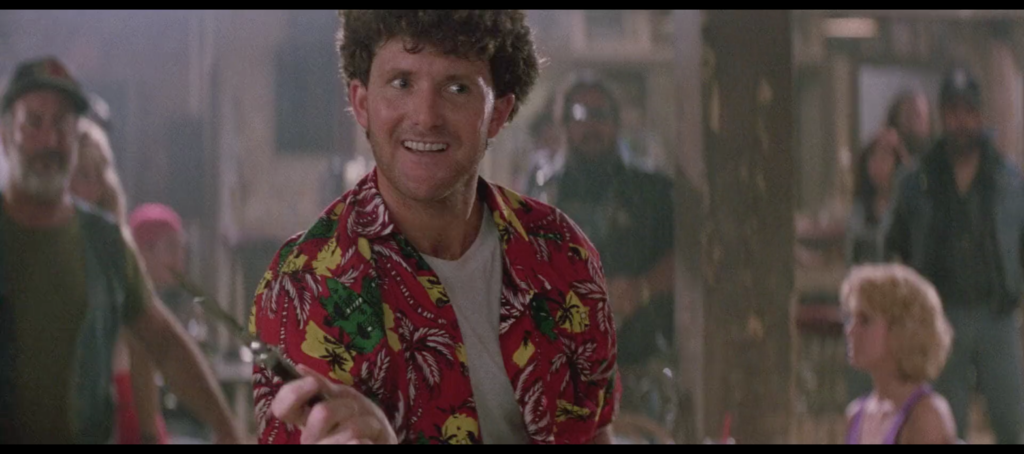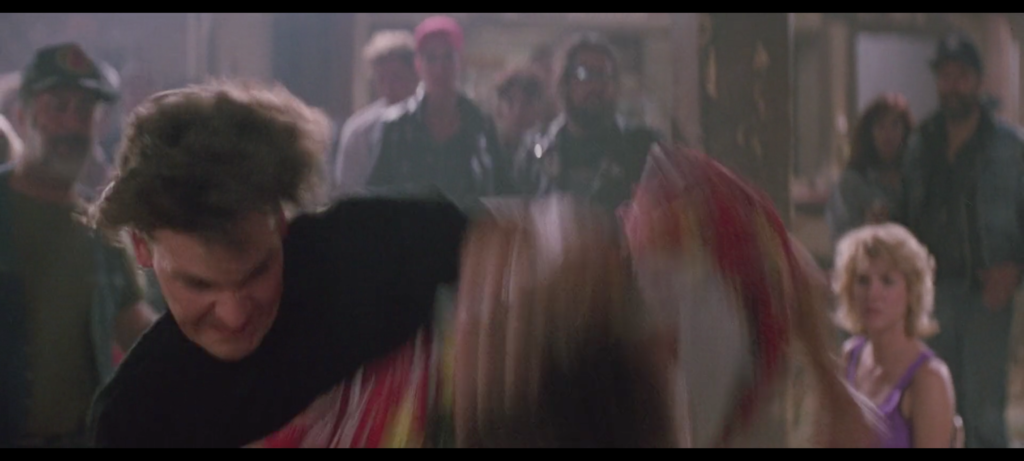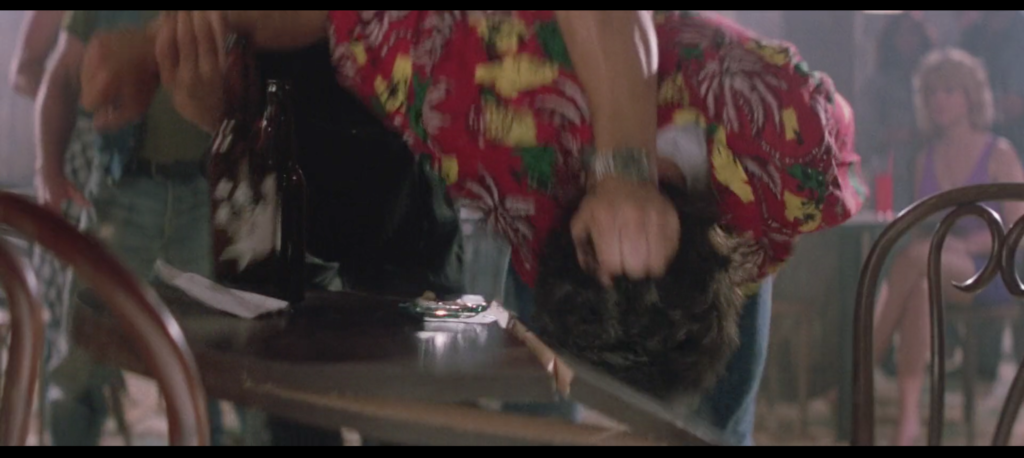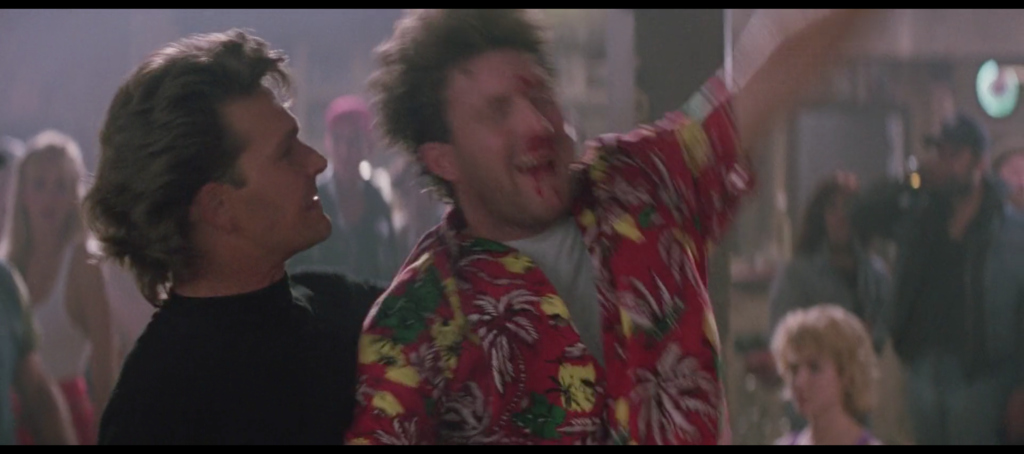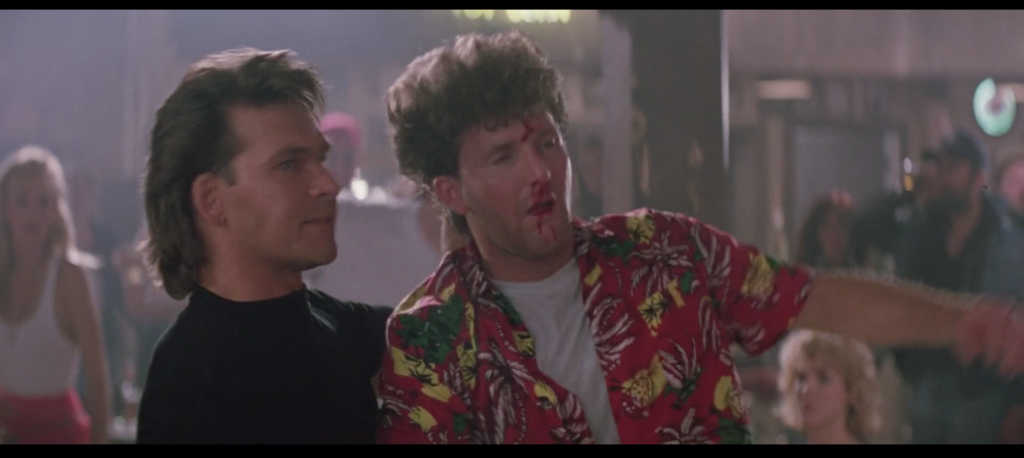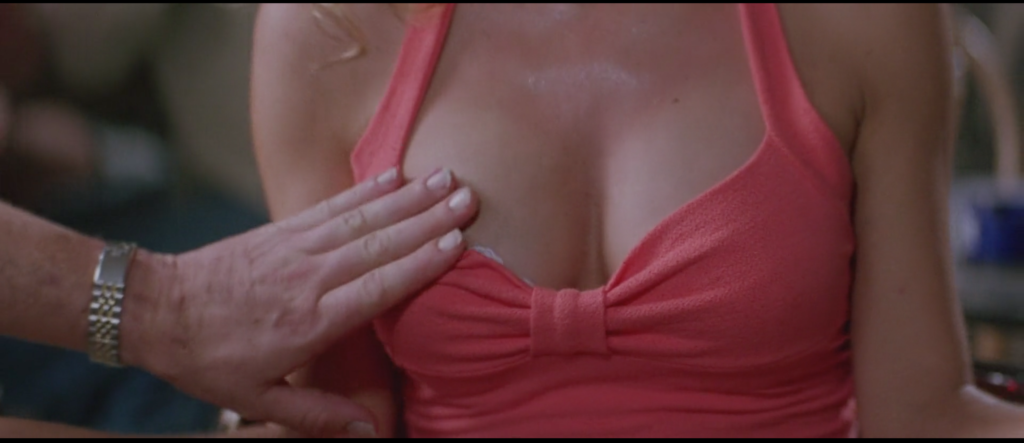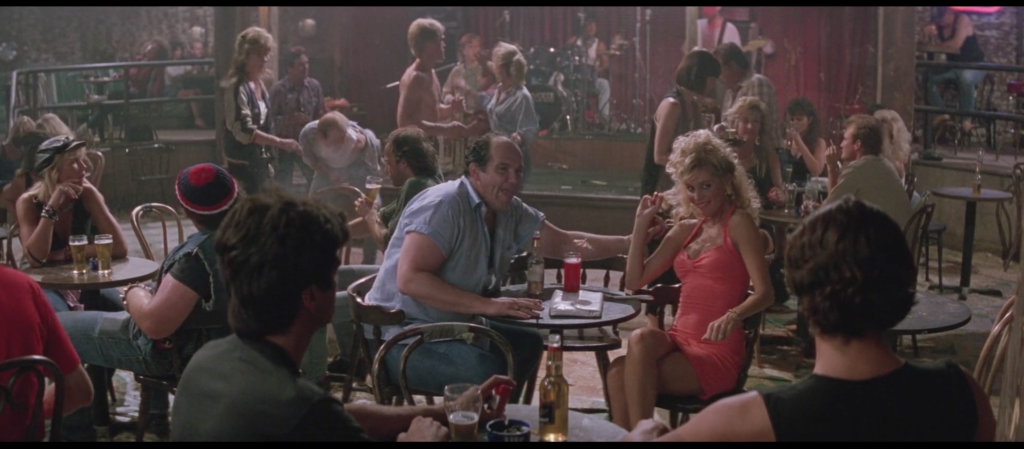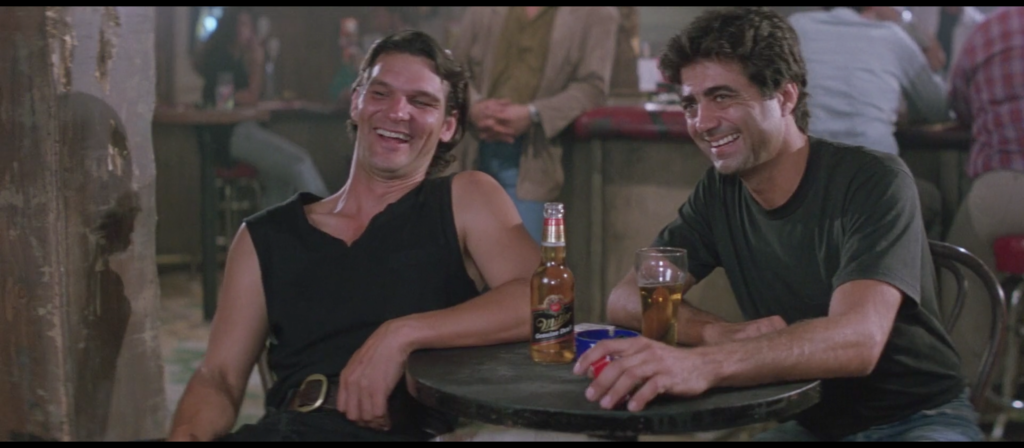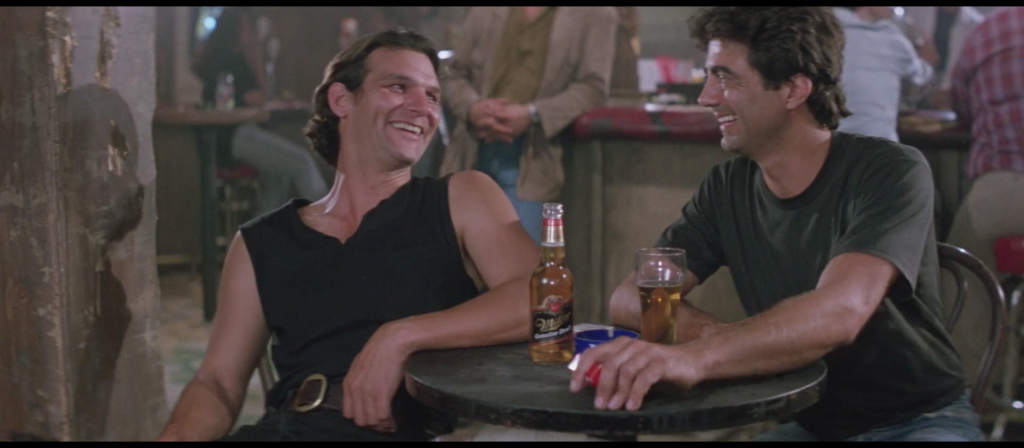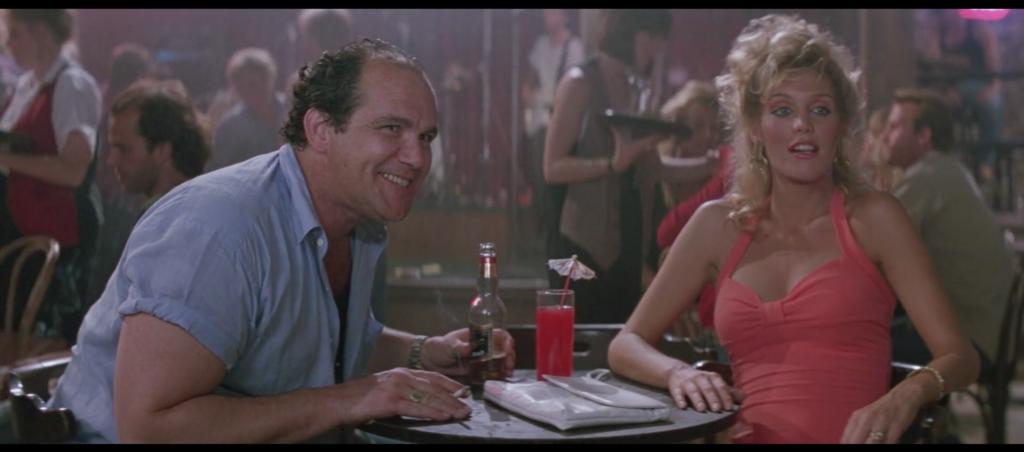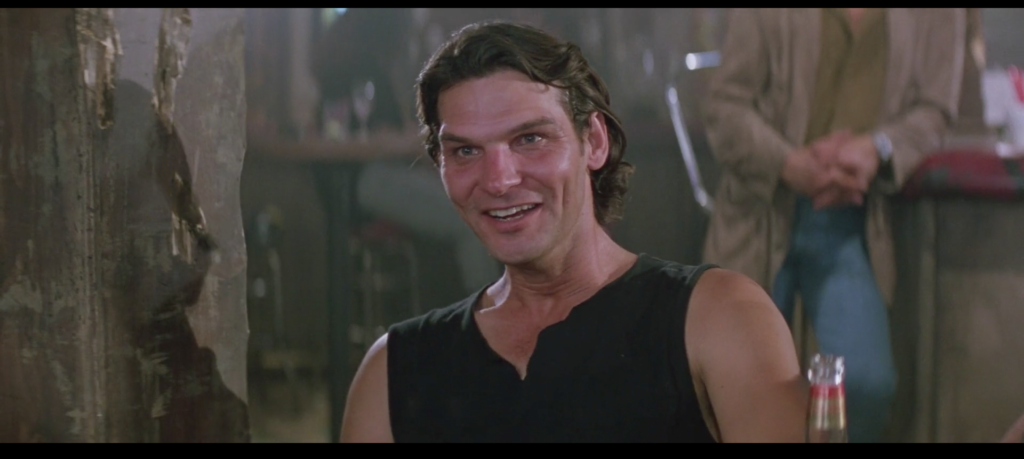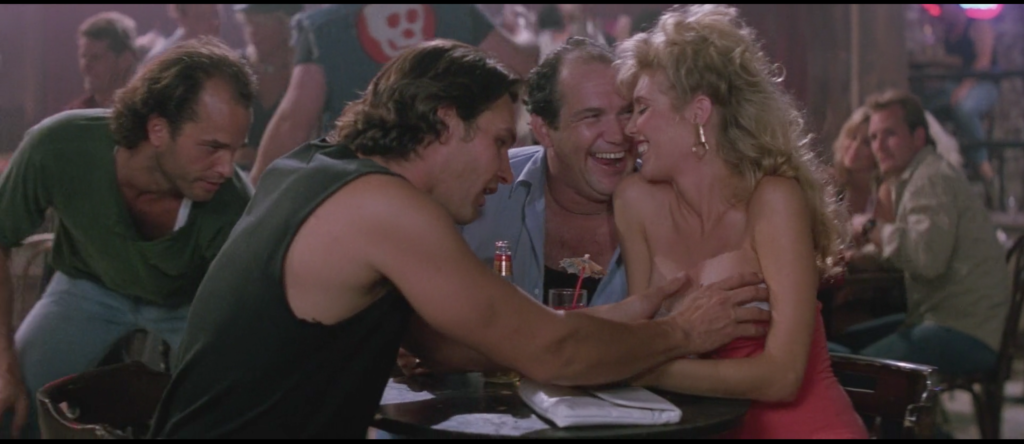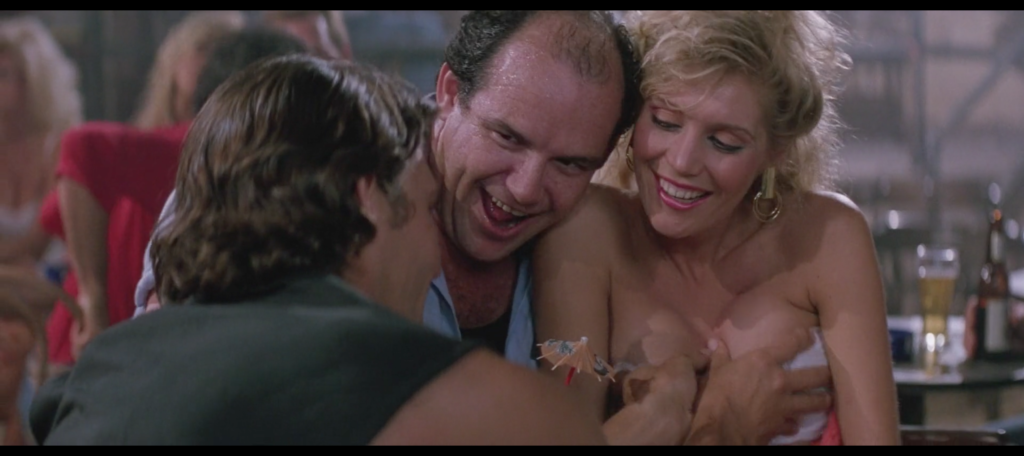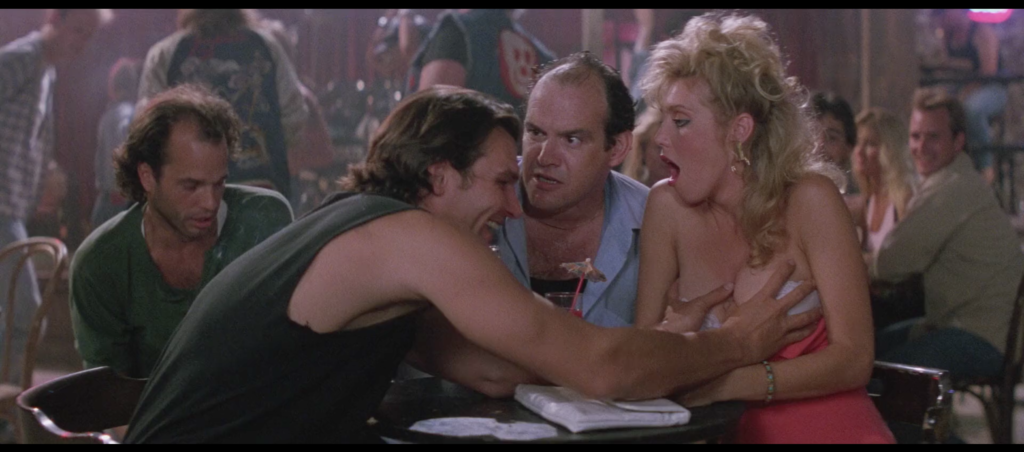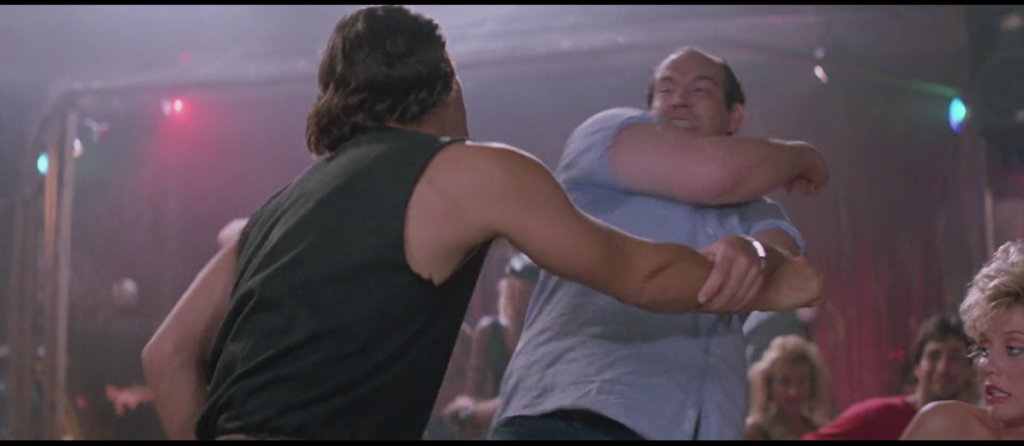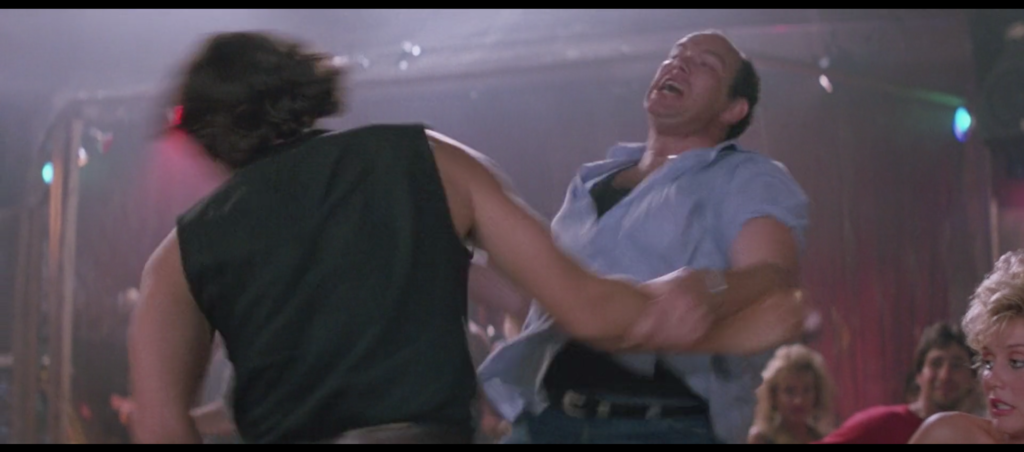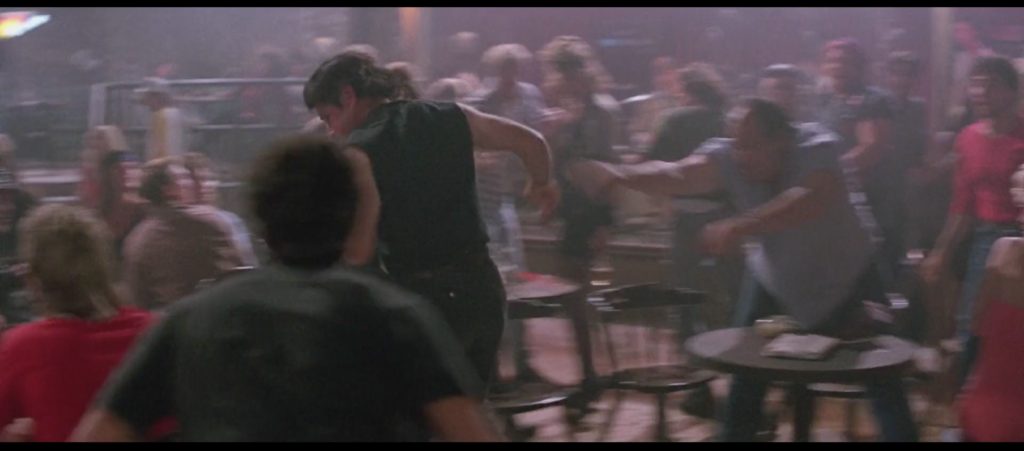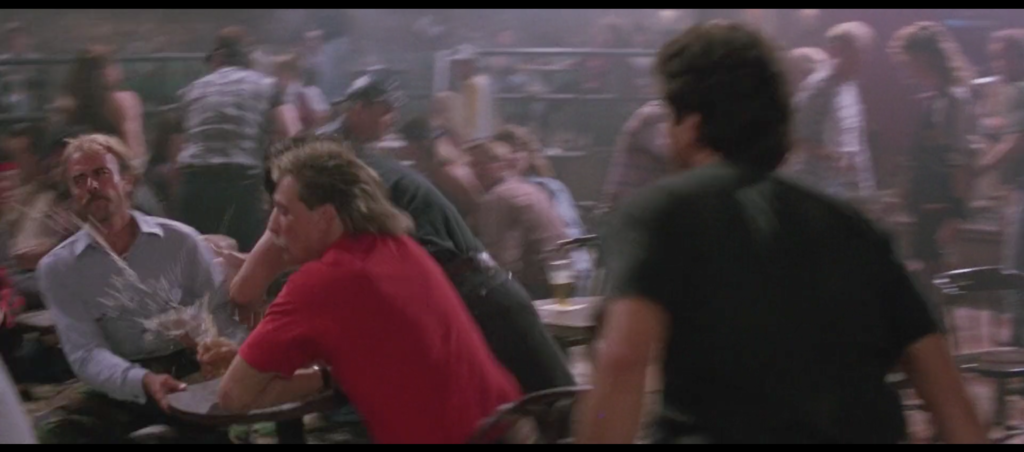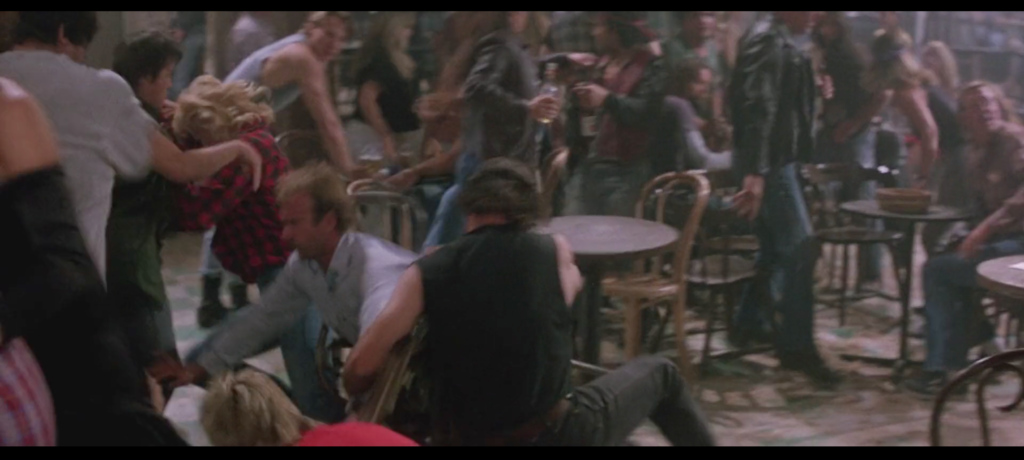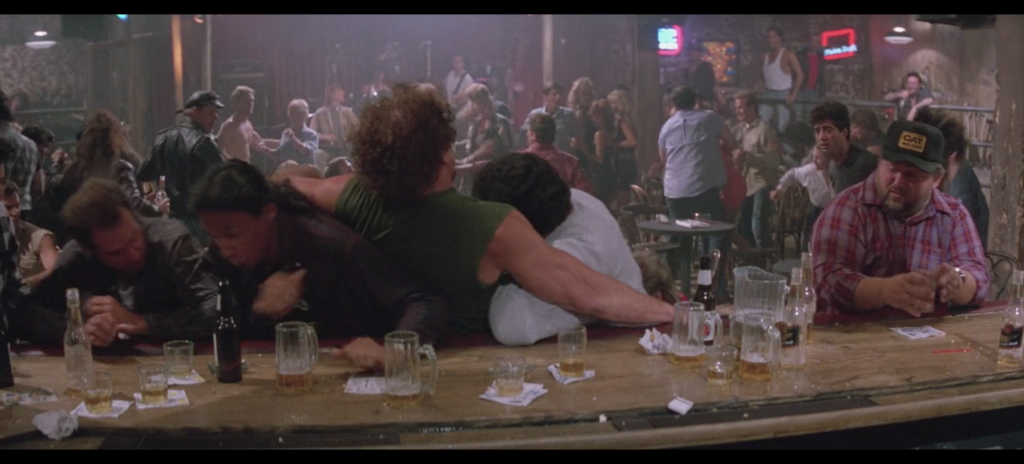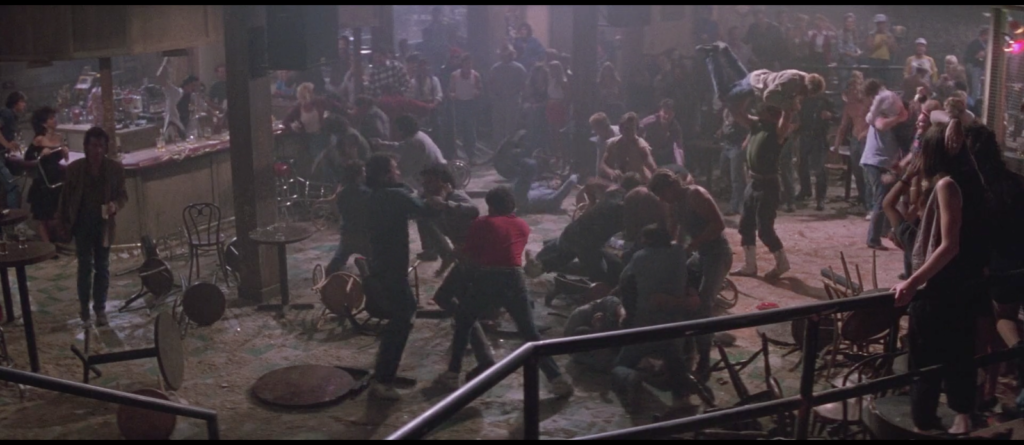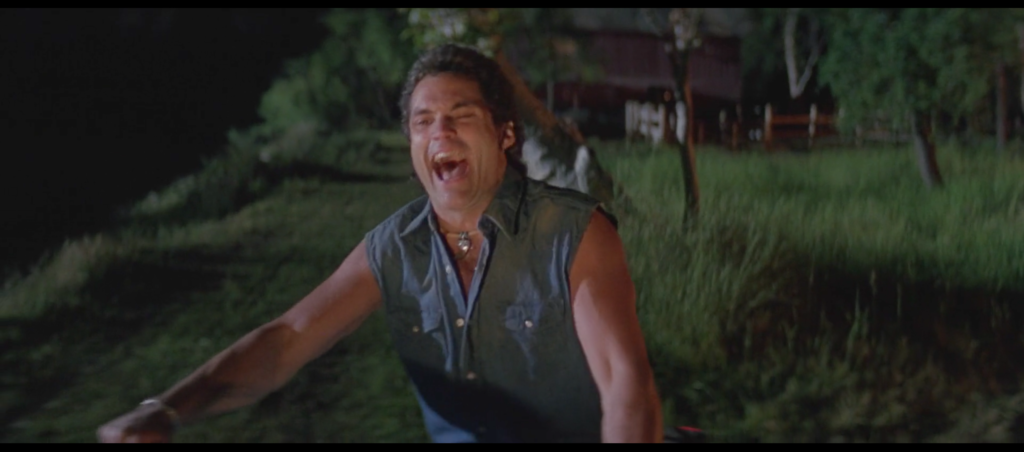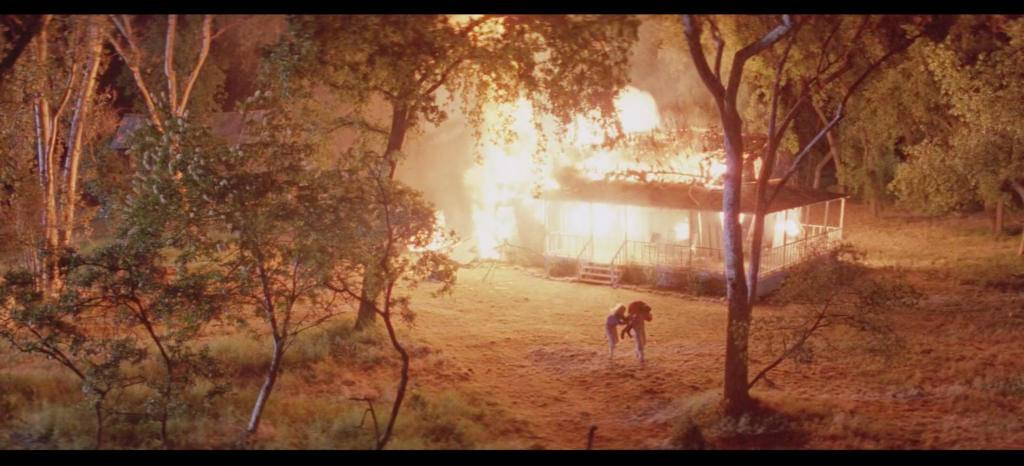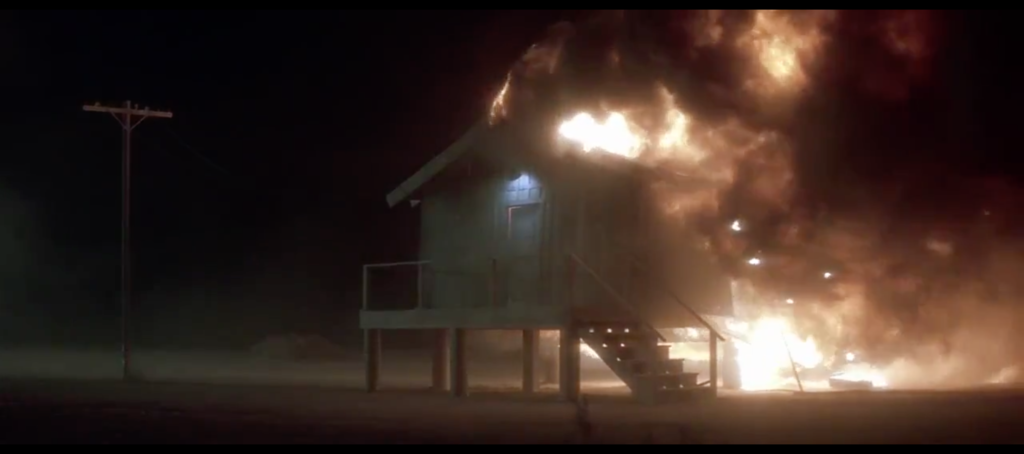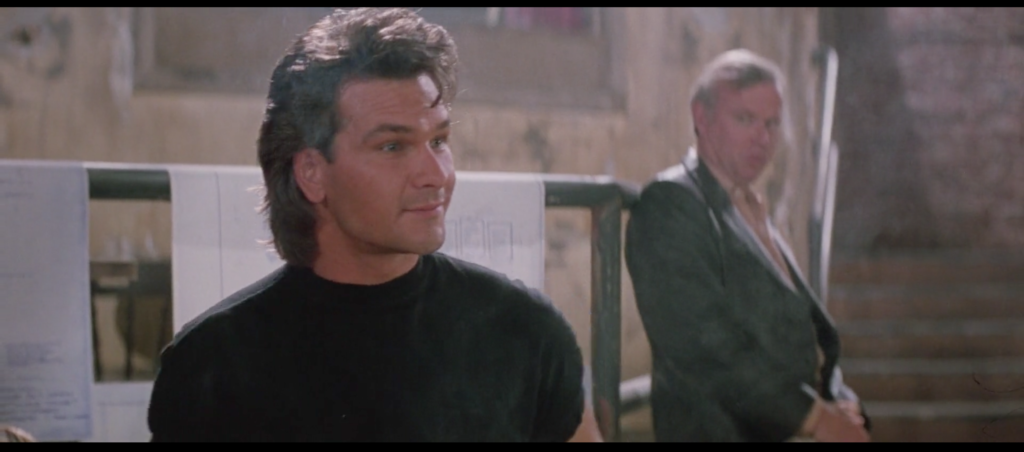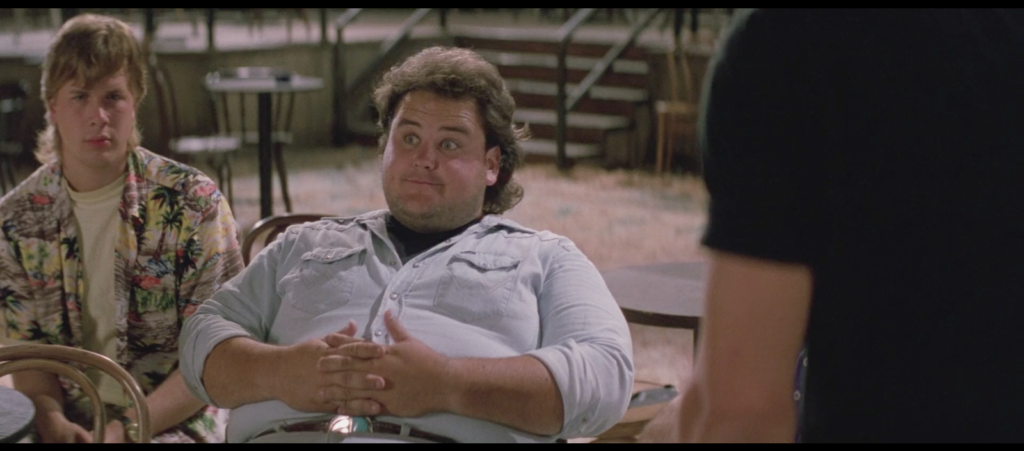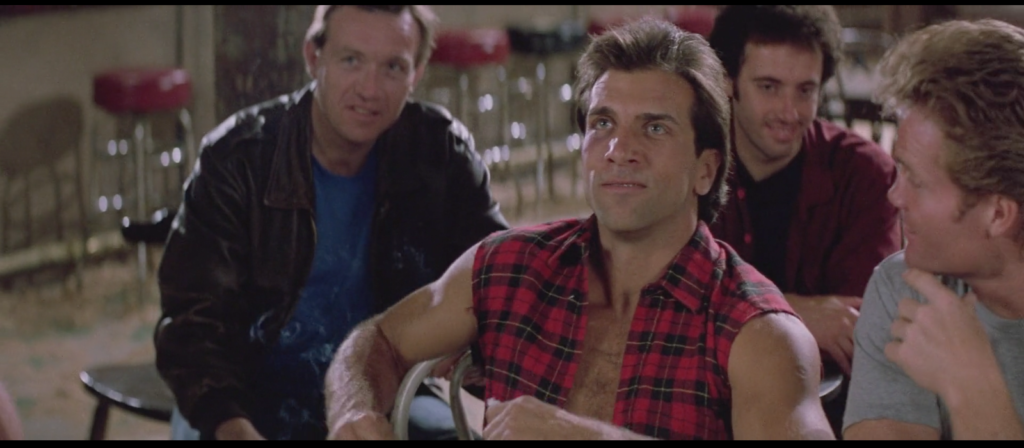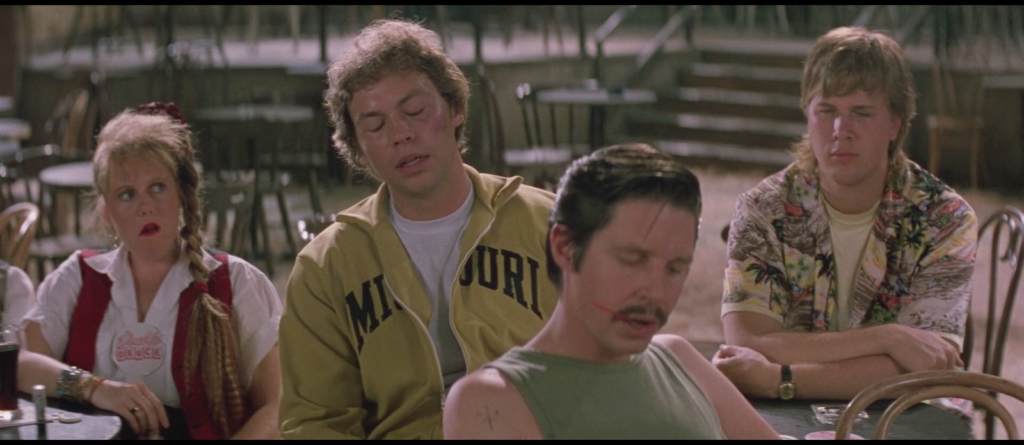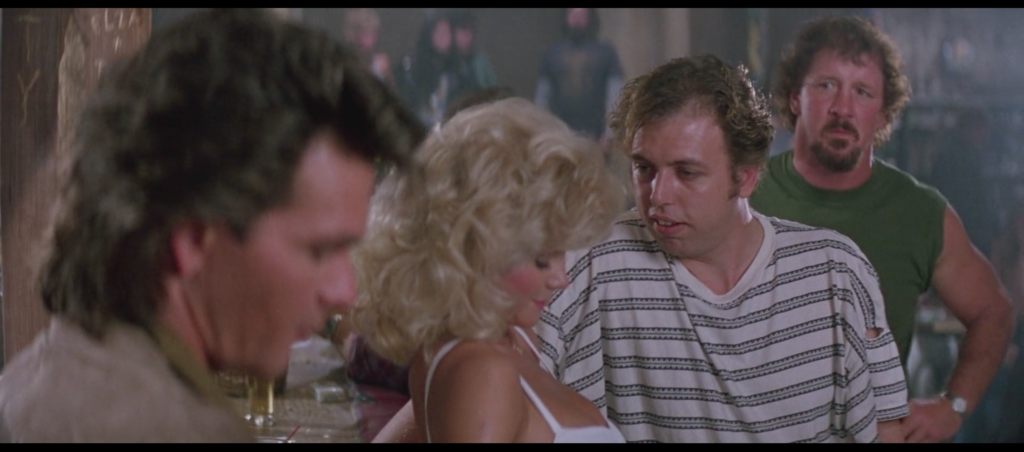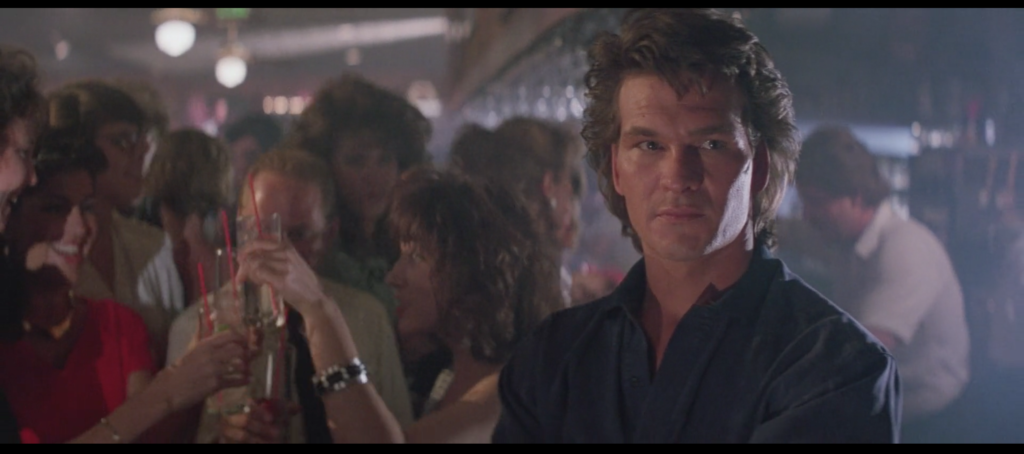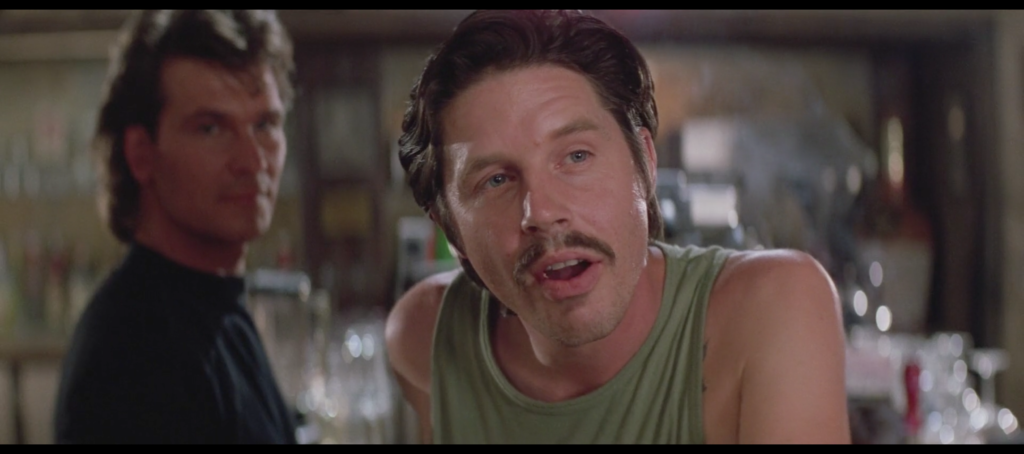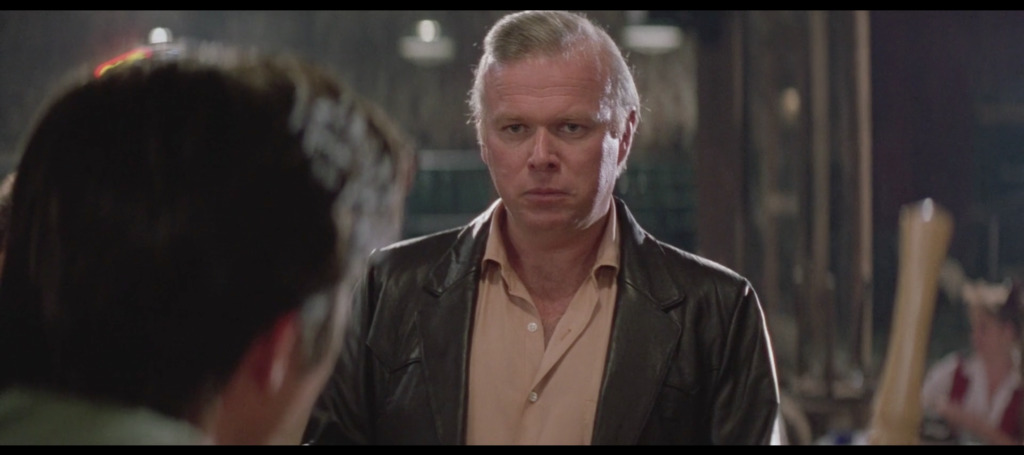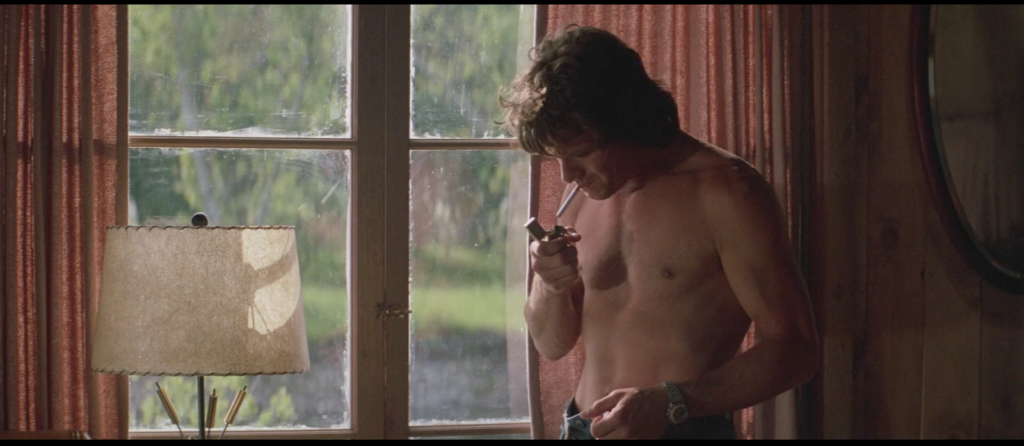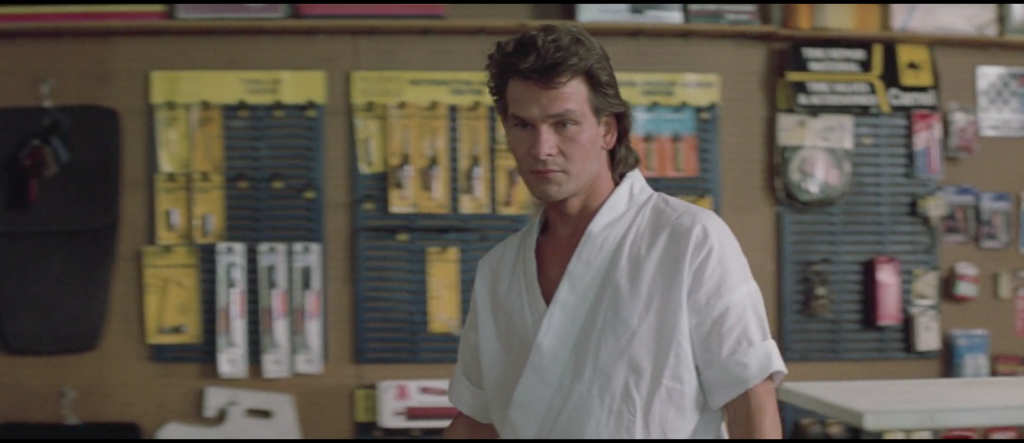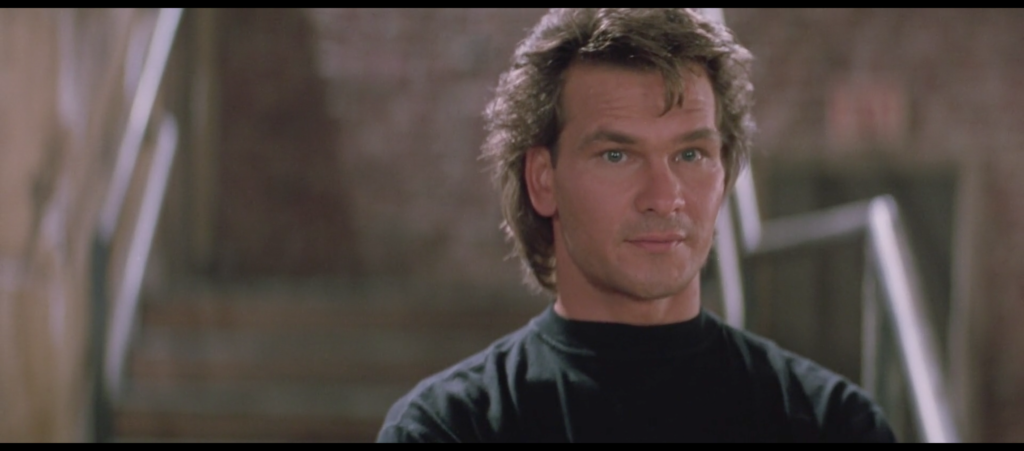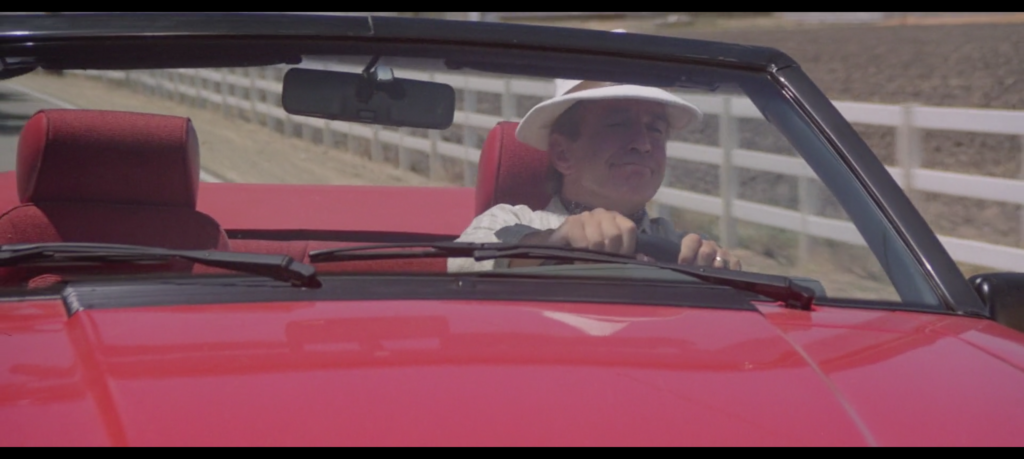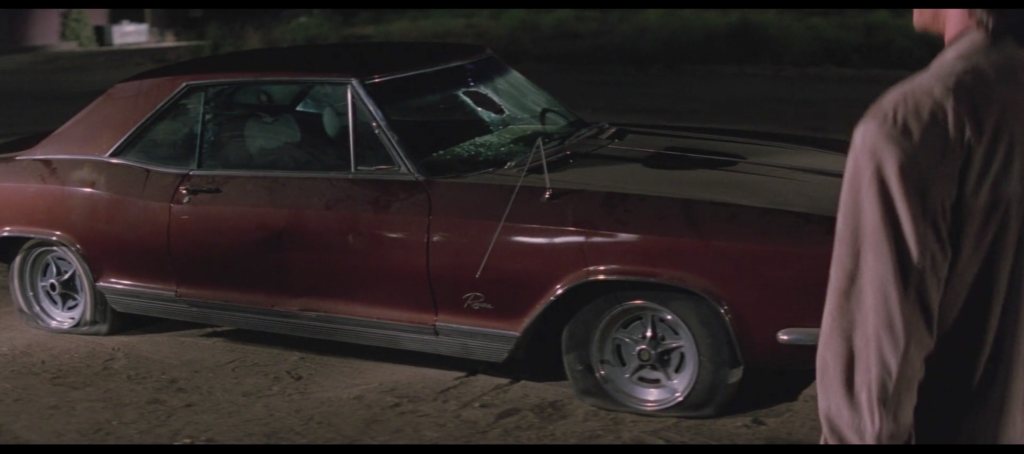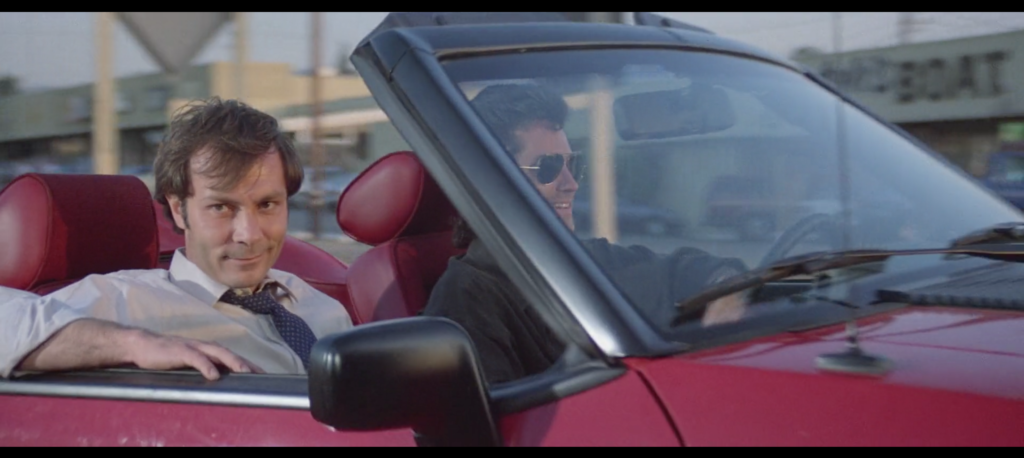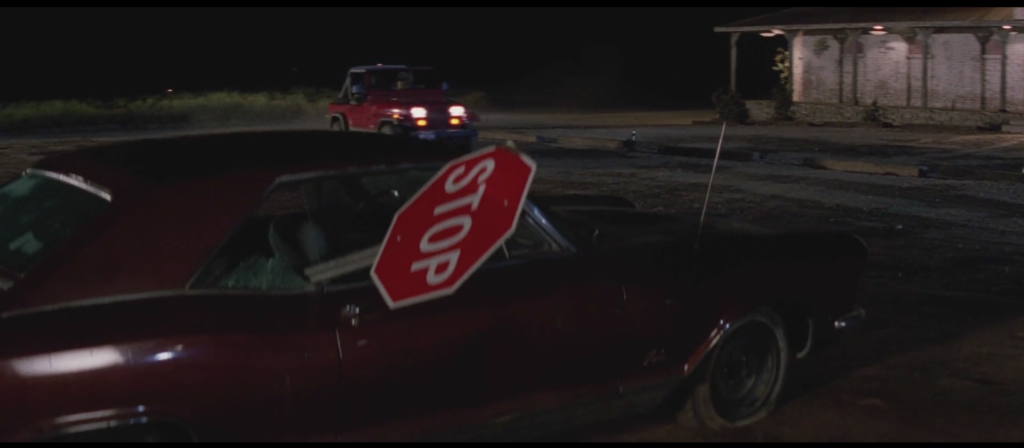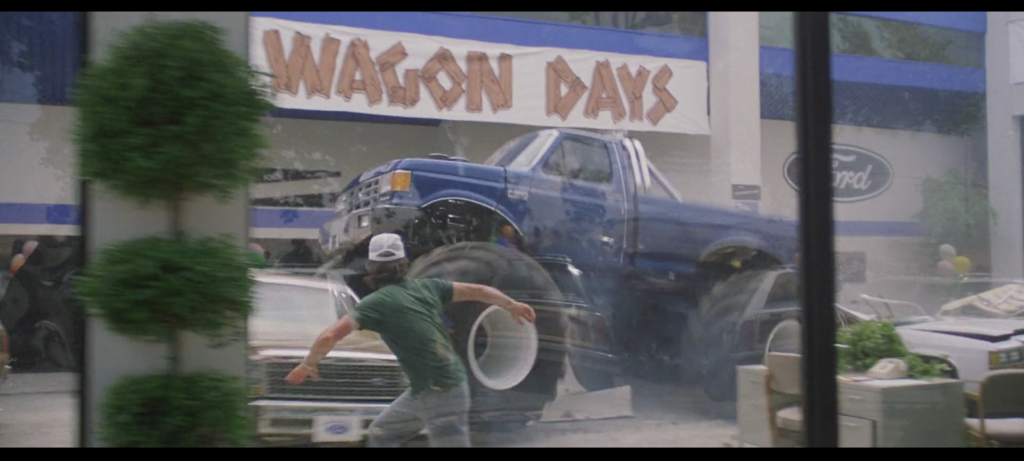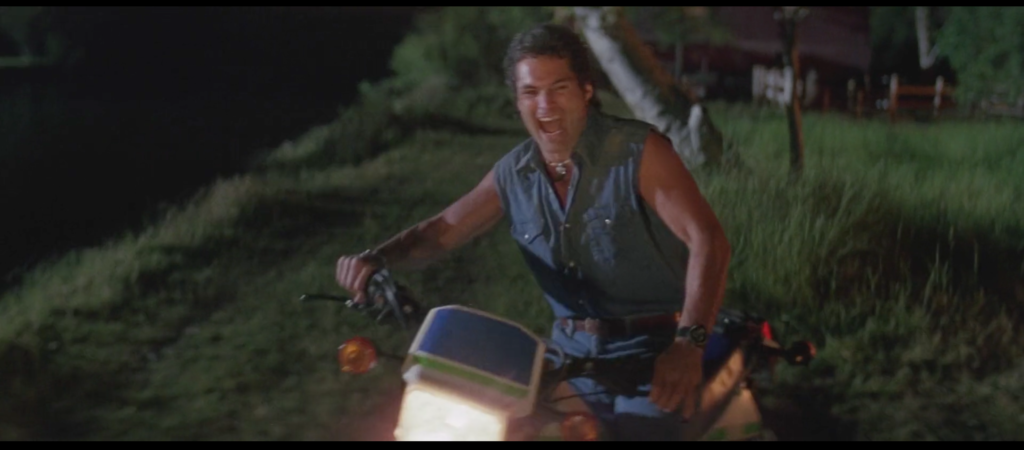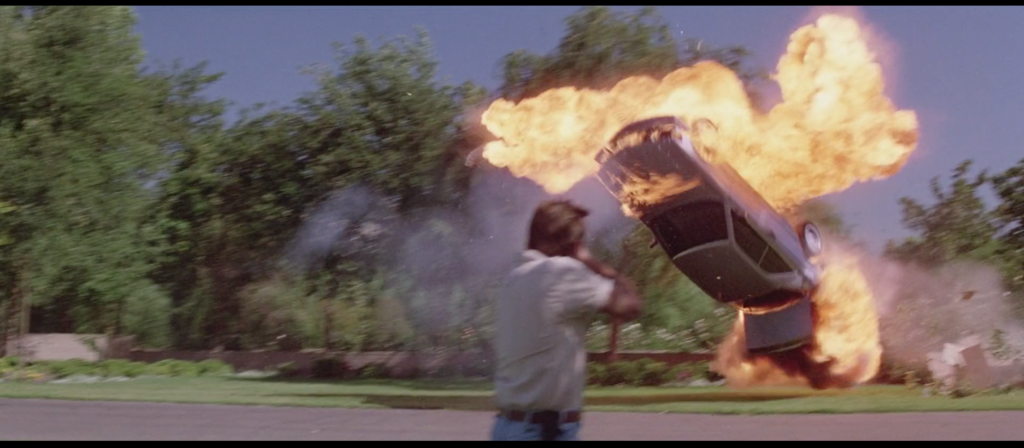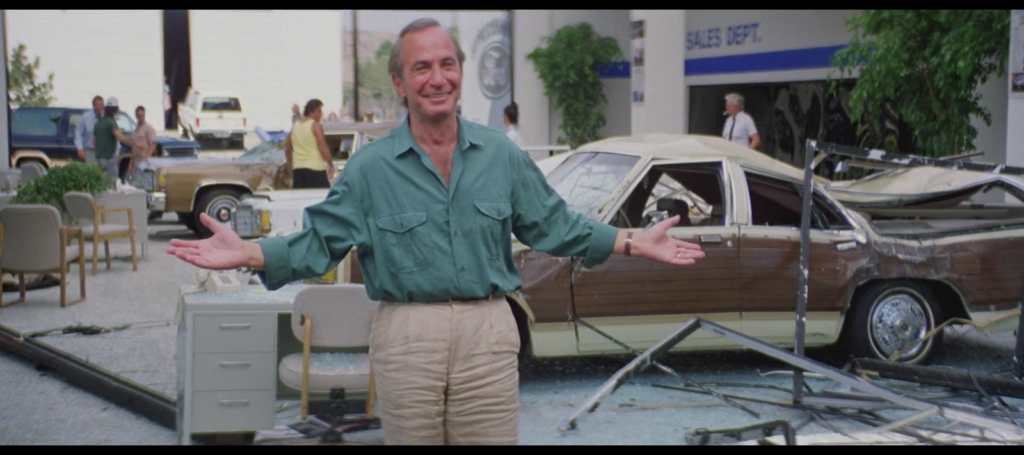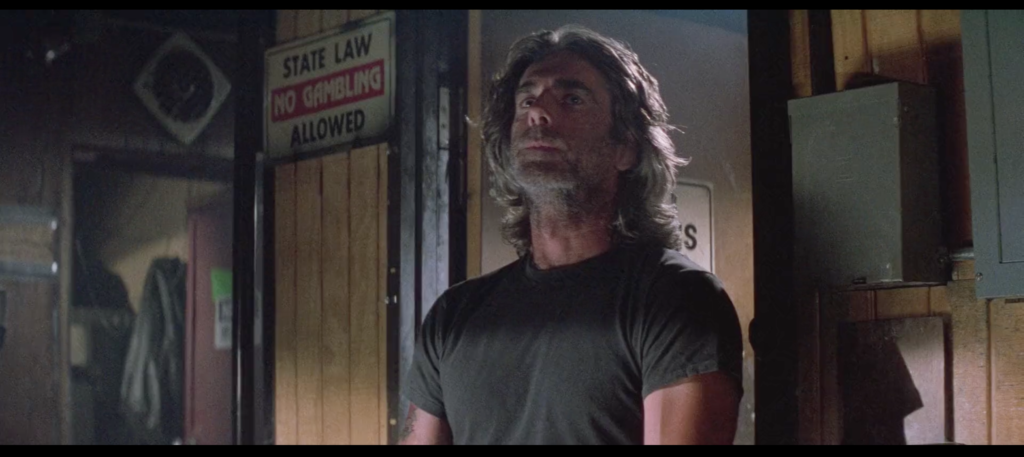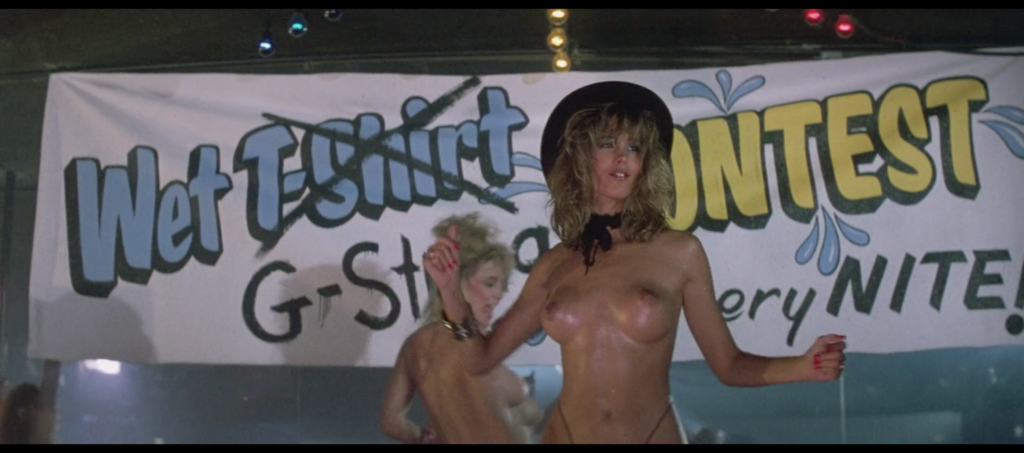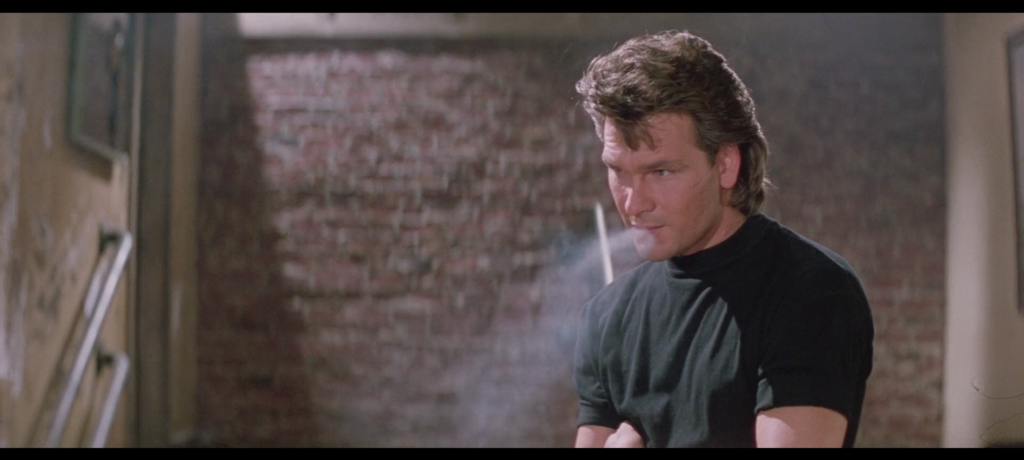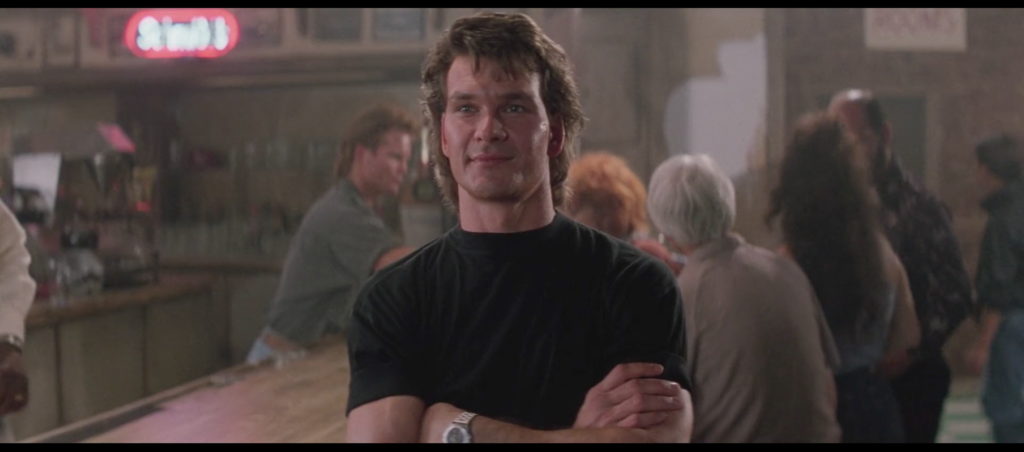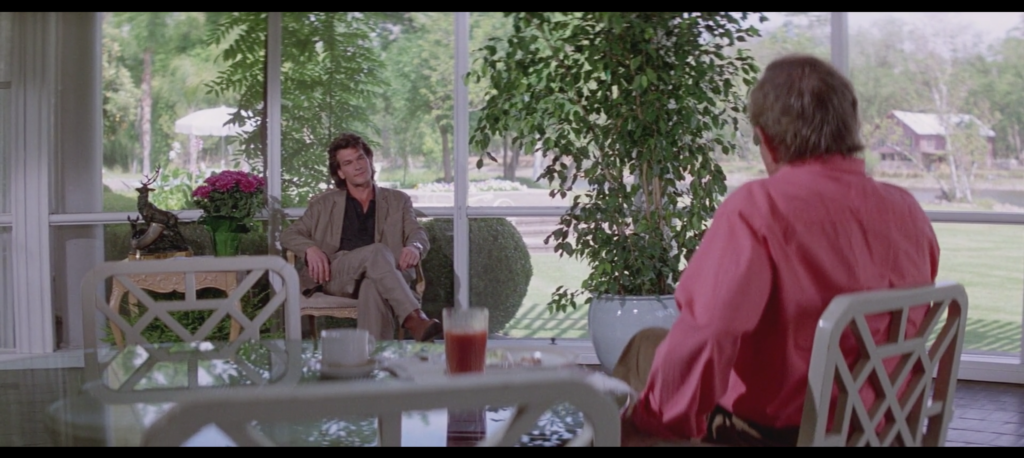Archive for the ‘Pain Don’t Hurt’ Category
040. The Second Rule
February 9, 2019“This is the new Double Deuce,” says Frank Tilghman. We are at the start of an all-hands staff meeting, and Tilghman is pointing to the concept art for the bar’s redesign. But standing nearby is his latest hire, Dalton. It is through Dalton, with Dalton, in Dalton that the new Double Deuce will be achieved. Dalton embodies the new Double Deuce. He is its future.
When Dalton takes over as cooler he becomes more than just the chief bouncer. His role is not to handle a series of discrete incidents, but to institute sweeping reforms that will eliminate such incidents forever. “It’s going to change,” he states—not a threat, not a promise, a fact. His bouncers, too, must change for this to take place. As below, so above.
Bouncing on the Dalton Path is a matter of following “three simple rules.”
This is the second.
2. Take it outside. Never start anything inside the bar unless it’s absolutely necessary.
A bouncer less wise than Dalton would think Rule 2 begins and ends right here. How much more could there possibly be to this purely practical commandment? Your job is to maintain a convivial atmosphere for the patrons of your establishment by keeping the bad element at bay. You can’t do this if you’re beating the shit out of a guy on the dance floor. Ergo, you either force or lure your opponent out of the bar—your ultimate goal at any rate—before engaging in fisticuffs. What else is there?
What else indeed. As you can no doubt imagine, many, many violent incidents occur at the Double Deuce between this speech and the end of the movie. Dalton and his men take it outside a grand total of once during that time. Dalton in fact grabs a guy by the back of the head and smashes his face through a table this very night. What conclusion can we draw from this?
What we have here is another “If you think this sentence is confusing, then change one pig” situation.
Let’s start with the assumption that Dalton, as evidenced by his own actions, must intend this rule to have some larger meaning beyond its (eminently sensible) practical application regarding the bouncer’s ideal field of battle. I would suggest that we look to the Third Rule for the key to unlock this mystery. A thorough examination of that rule must wait for another day, but for now suffice it to say “It’s nothing personal” is a central component.
Could it be the case that in commanding the staff of the Double Deuce to “take it outside” when the moment of truth arrives, what Dalton really means is to step outside themselves? Those who follow the Dalton Path must see themselves as parts of a greater whole. They are but tools in the hands of the Cooler; does the hammer hate the nail? They are the immune system of the bar-organism; does the white blood cell hate the infection in the wound? The bouncer is the agent of Gemeinschaft. Proper function necessitates depersonalization so that the wider view may come into focus.
Now let us go further. What is it to “start something inside the bar”? We have already learned that many of the forces that threaten the Double Deuce are not conflicts that arise organically between patrons, but deliberate infiltration and provocation directed by an outside agent: Brad Wesley. Wesley himself is merely a symptom of larger societal crises: capitalism generally, the tyranny of the small business owner specifically, toxic masculinity, and even, as we will see when we enter his Trophy Room, ecological destruction.
Moreover, let us not allow “conflicts that arise organically between patrons” to pass by unremarked upon. Dalton identifies the Double Deuce’s problematic clientele as “Forty-year-old adolescents, felons, power drinkers, and trustees of modern chemistry.” Cultural neoteny, the carceral state, alcoholism and addiction, and the role of business and government in fomenting all of the above: One need not absolve the meathead or the Knife Nerd of personal responsibility to correctly argue that they themselves are often victims of forces far beyond their control.
Now let us return to the Second Rule. “Never start anything inside the bar unless it’s absolutely necessary,” says the man who will break a piece of the bar’s furniture in half with another human being’s face just a few short hours later. Who is he really addressing here, and what is he saying to them? Is he simply telling the bouncers (and waitstaff and bartenders and band members and the unknown entity in the brown jacket) to avoid throwing hands inside these four walls? Or is he employing paradox to demonstrate that nothing ever truly starts inside the bar—that while the Dalton Path offers a safe route through the bar for all who choose to walk it, it is a road without beginning or end?
For our struggle is not against flesh and blood, but against the rulers, against the authorities, against the powers of this dark world and against the spiritual forces of evil in the heavenly realms. (Ephesians 6:12)
041. Breaking a table with a human face
February 10, 2019If you want a picture of the Double Deuce, imagine a table broken by a human face — for ever. I’ve been thinking about the way Dalton grabs the Hawaiian Shirt Knife Nerd who was willing to defend his girlfriend’s right to dance on a table literally to the death by the back of his head and smashes his face down into a second table so hard and so fast that the wood splinters cleanly in half a lot lately. It’s a terrifically intuitive and forceful bit of fight choreography, that certainly helps. It conveys Dalton’s efficiency of movement and his power at short range, key to making him seem like a physical threat when half the characters in the movie say “I thought you’d be bigger” to him at one point or another.
Crisp editing by Frank J. Urioste and John F. Link (Die Hard, RoboCop, Predator, Commando, Total Recall, Basic Instinct, Tombstone) sells the move, but not alone. As an actor, Patrick Swayze takes a heretofore unprecedented turn for the savage in this moment, scowling with fury we’d previously seen no trace of at all. As time passes we’ll see more and more of this look from him. (To the extent Dalton has a character arc it’s largely one long descent that begins at a moment we’ll discuss in detail later in this series and ends with five murders.) Dalton traffics primarily in a blend of the Western and Eastern forms of coolness; he’s gunslinger tough and martial-artsist enlightened. The audience needs to see what happens when he gets heated up, and how little normal men can do to stop him when it happens.
When does it happen? This is important as well. The scene that precedes the table incident is none other than the Giving of the Rules, in which Dalton lays out his credo for successful bouncing and cooling. “Never underestimate your opponent/expect the unexpected”? Check. Dalton chose to act in such a way that this guy was done before he even realized the fight had started. No surprises coming from that corner. “Take it outside/Never start anything inside the bar unless it’s absolutely necessary”? Okay, sure, we’ll allow it. This bizarre little man drew a knife and threatened to murder a bouncer simply because he’d been asked to ask his girlfriend to stop climbing on the furniture. Sounds absolutely necessary to me. (And the Third Rule? Perhaps you know it already, perhaps you don’t. We will not be discussing it just yet. We will not discuss it…until it’s time to not not discuss it. Let’s just say that grabbing a human being by his hair and forcing his skull through a table sturdy enough to dance on speaks volumes on the Third Rule’s contents.)
What happens immediately afterwards? Everyone in the bar gazes and gasps in awe. People nearly move in slow motion, they’re so stunned by his prowess. Even the woman whose boyfriend has just been given some kind of concussion gingerly takes Dalton’s hand to be led down off the dancing table, and looks back over her shoulder at him on her way out of the bar. This is a man worth turning into a pillar of salt for. “The name…is Dalton,” Cody announces from the stage (through the chickenwire), after being filled in by his sighted bassist as to the nature of the hubbub—like a talk-show host announcing a guest, or the lead singer introducing the band. People in the Road House Universe absolutely adore people who break tables with other people’s faces.
Finally, there’s the savagery of the act itself. Powerful agent to the uninitiated. WA-BAM! He broke a table with a guy’s face! Didn’t even give him a chance! If you’re a first-timer and you reach this moment, any fears you may have had as to whether the first big barfight was the last time you’d see anything that gratuitously, moronically violent, this lays your fears to rest. You ain’t seen nothing yet.
042. Attitudes
February 11, 2019Part One of “The Agreement,” a special Valentine’s Week series
“Ever seen a better pair a’ attitudes?”
Even for a film that has already introduced us to “dirtball” and “moose-lips” (though “chicken-dick” is still a ways away), Road House still enters uncharted linguistic territory with the euphemism the person on the left of the above photo uses for the breasts of the person on the right. This is of course the right, perhaps even the calling, of screenwriters David Lee Henry and Hilary Henkin. If your goal is to make an audience that is quite possibly already inured to chuckleheaded idiocy sit up and take notice when a large, sweat-soaked gentleman, whose first line of dialogue is the kind of guffaw you’d write out as “HAW HAW HAW HAW HAW!” like he’s Pete from the old Mickey Mouse cartoons, proudly displays the body of his special lady for particularly besotted onlooker…I mean, admittedly the bulk of the work has already been done for you. Still, in a language with more slang terms for tits than tits themselves, “attitudes” doesn’t hurt.
Our new friends, billed in the credits as Sharing Husband (Christopher Collins, no relation) and Well-Endowed Wife (Cheryl Baker) may have hit on something more than skin deep with this coinage, however. One look in the eyes of Well-Endowed Wife will tell you that her attitude is, indeed, half the fun of engaging with her in a bit of shitface-drunk barroom repartee. It’s in the way she smiles, twirls her hair, angles her body toward the audience, and on and on. As we’ve said before, arousal is lovely, desire is lovely, and by that standard Well-Endowed Wife is lovely. It don’t mean a thing if it ain’t got that swing, and to borrow the words of a great man, Well-Endowed Wife is swingin’ on the front porch, swingin’ on the lawn, swingin’ where she wants cuz there’s nobody home.
But the use of “pair” is unintentionally revealing. (That’s the last time you’ll hear that phrase used to describe this scene.) The joy on Sharing Husband’s face and in his voice as he proudly draws attention to Well-Endowed Wife’s unabashed sexual self-confidence is unreconstructed and pure and palpable. (Not as palpable as some other things in this scene, but still.) Without his Wife’s endowments, Sharing Husband would have nothing to share. She’s the reason he is who he is, in a sense so literal it scrolls up the screen in black and white at the end of the movie.
And now we come to the heart of the matter. Would either of them look like this, act like this, feel like this without the other across that table? For while her happiness clearly fuels his, we may conclude from their conduct, and from the words chosen to describe the situation, that the reverse is also true. Just as Sharing Husband requires the endowments of his Wife to thrive, Well-Endowed Wife relies on her husband to share those endowments to maximal erotic effect. To give the complexities of cuckoldry, polyamory, and swinging as thorough an examination as they deserve would distract us from walking the Dalton Path. But while there are certainly varieties of each in which the presence of both partners is not necessary to achieve the desired sexual frisson, that does not appear to be the dynamic in play here. They exist in tandem, and it is in tandem that they must be observed. They take that sawdust-strew stage together.
Sadly, they are given reason to reconsider the particulars of their arrangement by scene’s end, in this respect and many others. For now, though? The whole is greater than the sum of Sharing Husband and Well-Endowed Wife. They are pandrogyne, the two-in-one. Ever seen a better pair a’ attitudes? Can’t say that I have, sir. Can’t say that I have.
043. Good times with good friends
February 12, 2019Part Two of “The Agreement,” a special Valentine’s Week series
These two fellows are out for a night on the town, and their evening has brought them to the Double Deuce. There they can enjoy the musical stylings of the Jeff Healey Band, watch a shirtless man dance, interact with such luminaries as the Laughing Man and Mr. Clean, watch two brothers fight each other until they’re rolling on the ground near the pool table, potentially get beaten up by a bouncer with anger management issues, buy drugs from a waitress, throw beer bottles at a chickenwire fence, watch a bouncer pick up underage girls, buy a Buick—the world is truly their oyster. They’re sharing a drink they call Miller Genuine Draft, but it’s better than drinking alone.
And what a pair a’ attitudes they are! Our friend on the left, known to posterity as Gawker (actor Michael Wise), has the glee-squinted eyes and three-mile smile of a guy whose inebriation has enhanced his personal sense of good fortune tremendously. As well it might! He’s being inveigled to observe the excellent breasts of the Well-Endowed Wife by her Sharing Husband, an invitation he has gratefully accepted. “Fine, ain’t they?” Sharing Husband asks rhetorically; look at Gawker’s face and see if you can guess the answer.
His unnamed and uncredited pal is a delight as well. With bright eyes and bushy brows that both a) make him look like the wacky horny best friend in any number of ’80s sex comedies and ’90s Skinemax flicks, and b) appear as if they got spooked by Gawker’s smile and migrated to the next face over to avoid the space crunch, he plays a similar role in relation to his gawking friend that SH plays to WEW. He is there to beam approval, to offer encouragement, to generally egg things on. He too is clearly tickled pink by Well-Endowed Wife’s namesakes, but his gaze is reserved as much for Gawker as it is for her. He wants to see his friend seeing the thing they’re both seeing.
This is more common in Road House than you might think. In this film, it is often not enough to experience events on one’s own. An audience is required to confirm that the thing that has happened really has happened. It makes sense given the subject matter. When you’re a famous cooler hired to clean up an absolute cesspool of a nightclub, it won’t do to bust a few heads anonymously. The word needs to get out, to both the nice people and the ne’er-do-wells, that things have changed. By the same token the bad guys need their fellow goons’ laughter and howls of approval to make them feel their actions are justified, and they need not just their direct victims but everyone else to see what happens when they are defied. By the back end of the film Brad Welsey’s terroristic attacks on businesses who resist his protection racket take place for virtually no other purpose.
Gawker and friend aren’t keeping each other in a fashion anywhere near that brutal. But as we asked yesterday regarding Well-Endowed Wife and Sharing Husband, would the events that are about to unfold have taken place if Gawker had gone to the Double Deuce solo that night? Or is the presence of a friend, to exchange knowing glances and exclamations of pleasure, to verify and reify the spectacle, required to fully enjoy that spectacle? And is that not unlike the act of watching Road House itself?
044. The offer
February 13, 2019Part Three of “The Agreement,” a special Valentine’s Week series
When you write an essay about Road House every day for a month and a half and counting, you learn some wonderful things. As mentioned earlier, Sharing Husband is played by one Christopher Collins (no relation). What I did not know until a reader kindly brought it to my attention is that Mr. Collins was also a voice actor under the name Chris Latta. Not just any voice actor, either. The same guffawing bumpkin who asks “Ever seen a better pair a’ attitudes?” is the voice (screech? wail?) of Starscream from Transformers and Cobra Commander from G.I. Joe, two of the most distinctively abrasive villains in the entire pantheon of early-to-mid-Eighties boy-oriented action-figure commercials in children’s-entertainment form.
Cobra Commander in particular was for me the sound of an entire school of childhood villainy, and a very popular school at that: the chickenshit heel who looked much cooler than he actually was. (Skeletor is the other go-to here.) Any time I had access to a Cobra Commander action figure I felt behooved to swing in the opposite direction and make him competent and fearsome—the lack of respect shown him by his own goons, much less the Joe Team, bothered me that much. Anyone with a mask collection that rad, I reasoned, deserved better. Yet such was Latta’s skill in voicing the character that I maintained the same timbre to the best of my ability even as I substantially changed his skill set. This was not a voice you could shake so easily.
To be sure, the voice Latta/Collins provides for Sharing Husband is less distinctive and more easily imitated than Starscream or Cobra Commander (or the even more eardrum-annihilating D’Compose from Inhumanoids, the …And Justice for All to the other villains’ Ride the Lightning and Master of Puppets). Latta also voiced some of the Simpsons characters during the cartoon’s first season; his Mr. Burns, an instantly recognizable voice that Harry Shearer was nonetheless able to recreate perfectly and play for the rest of the show’s 78-year run, is a creation closer to Sharing Husband’s mark. But learning that Collins was a voice actor by trade, rather than a stuntman as I’d assumed, made his marvelously cartoonish delivery of this scene’s central offer easier to contextualize.
“Tell you what,” he says to the Gawker as the man ogles Well-Endowed Wife and her pair a’ attitudes. “For twenty bucks…you can kiss ’em!”
The offer itself is a wonderfully dumb surprise, of course. It’s “Take my wife—please” with a pricetag. His subsequent repeated elaboration that this amounts to “ten a kiss” implies that either there’s a cheaper option on the table, like going to Subway and getting the six-inch instead of the foot-long, or perhaps that you save if you buy in bulk off the individual price of $15 per breast. The whole thing somehow manages to be both salacious and childish, like if the graffiti on the wall provided a number for neither a fuck nor a Buick, but the opportunity to “check out my weiner.”
But as you might expect from an actor with Collins’s bonafides, it’s all in the delivery. His eyes shine with twinkle straight out of Looney Tunes. A wolfish grin borrowed from Tex Avery spreads across his broad sweaty face. His eyebrows move with exaggerated Groucho Marx mischief. After being relatively deliberate with tell you what and for twenty bucks, he whips through you can kiss ’em in a pair of rapid up-and-down inflections, like if he says it fast and forcefully enough it can be fired directly into the brain of his mark, so he’ll think it was his own idea.
I make a lot of hay out of a lot of minor Road House moments, because they often communicate much more than intended. That isn’t the case here. This is a minor Road House moment that does exactly what the expert performer behind it set out to do, no more and no less. He wanted to seem funny, horny, eager, slightly stupid, and wholesomely sleazy. Unlike he perpetually failing Cobra Commander, he got what he wanted.
045. ARE YOU KIDDING?
February 14, 2019Part Four of “The Agreement,” a special Valentine’s Week series
“ARE YOU KIDDING?” All caps. No question about it. Actually: “ARE YOU KIDDING?!?” Emphasis in the original. Phonetically, “URYEW KHIHDDINGH?!?”, the first two words slurred into one, the third fired out of a shotgun. An incredulous gasp and a barbaric yawp. The voice of the world’s happiest man, at the very moment he becomes the world’s happiest man, and realizes he’s become the world’s happiest man, simultaneously. The instant when the Gawker crosses the threshold to become the Groper, a three-word doorway he creates and passes through, pulling it shut behind him. A sound effect that accompanies a fantastical contortion of the facial muscles responsible for grinning, taxed to their limit. The noise of a large head on a large neck, jutting forward, physically penetrating the barrier between the potential and the actual. The cry of sweepstakes winners, of hidden-camera prank-show targets, of people who’ve been told this one’s on the house. When you both can’t believe it and you gotta believe! A sound like none heard before or since. An uncommon expression of a familiar sentiment. A singular verbalization of a universal sensation. A sleeveless shirt of a sentence. A microphone held to beer-moistened bluejeans. A line reading greater than any other in a film full of the best line readings in the action-movie canon. The calling card. The fanmaker. The callback generator. The line most likely to be repeated by the inebriated audience. The equal and opposite reaction to “Pain don’t hurt.” A record-player needle dropped into the Venn diagram overlap of drunk, dumb, and horny. A death-row pardon for a man sentenced to never whack it again. The end of “A Day in the Life” but with belches. “Yakety Sax” with a Tristan Chord. Cleavage synesthesia. Happiness is a warm pair a’ attitudes. All you need is twenty dollars and a wet dream. Actor Michael Wise as Gawker in the film Road House, responding to the news that he can kiss the marvelous breasts of a total stranger, provided he pays her husband twenty bucks for the privilege. Perfection.
046. Tableau II
February 15, 2019Part Five of “The Agreement,” a special Valentine’s Week series
I’m sitting in a bar writing this. The bar’s name is Duggan’s. Duggan’s is one of five Irish pubs within a one block radius of my apartment. (Jameson’s, McCarthy’s, Cork & Kerry, and Fallon’s are the others. Arps Tavern too, if you wanna get a little creative with your geography. This does not include the five non-Irish non-pub restaurants with a liquor license in the same area.) What you’re seeing above is not a scene that takes place at Duggan’s, young and dumb and full of cum as its clientele often is. On the kinds of nights when people who are young and dumb and full of cum go out and socialize, anyway. It’s otherwise the province of the shrieking Irish-American racists whose every breath is a betrayal of the Irish liberationary socialist tradition they all believe they support, sans the socialism. Anyway. Duggan’s boasts a relatively genteel crowd even at its most raucous compared to McCarthy’s, the bar whose parking lot abuts my apartment building. I’ve stepped inside there a grand total of once, to see if anyone belonged to the car in the lot with its headlights on. (They did not. At least not that they could remember.) McCarthy’s produces a nightly brawl like Kander & Ebb. I wish I were kidding. Every single night there’s some…what is the Long Island Irish equivalent of the word “guido”? because there really should be one, and “paddy” doesn’t quite cover it. Anyway—every single night there’s some moronic Hibernian, some bog person whose great-great-great-grandma snuck past Ellis Island despite Thomas Nast’s best efforts, screaming “HOLD ME BACK BRO, HOLD ME BACK BRO” or “MY FUCKING SISTER BRO, MY FUCKING SISTER” or “COME BACK COLLEEN, COME BACK COLLEEN” at the top of his lungs about fifteen away from MY HOME where my wife-to-be sleeps and my children play with their toys. McCarthy’s is the kinda place that they sweep up the eyeballs after closing. That’s not where I’m, currently, at. The distinction I’m attempting to draw is that what goes on at the Double Deuce during our first visit to the Double Deuce is intended to be unique to and representative of the Double Deuce. So let’s revisit the image above, and let’s do it from right to left, like we’re reading manga or the Torah. You have Well-Endowed Wife, eyes closed and smiling, thrilling to the sensation of a gormless stranger’s hands on her tits and her husband’s attention and affection resulting from same, I mean she’s transported by it. You have Sharing Husband, cackling with glee, simply could not be happier and more entertained by the spectacle of other men enjoying his wife’s body and his wife’s body enjoying other men. You have Gawker, now and forever Groper just like Donald Merwin Elbert became now and forever The Trashcan Man when he blew those oil tankers in Powtanville (Hey, Trash, what did old lady Semple say when you torched her pension check?), as riveted by this woman’s tits as the first men on the moon were by the earthrise. And—and this is key—you have Heckler, played by Charles Hawke, previously remarkable in this film for hollering “HEY YA PAID TA PLAY PLAY!” AND THROWING A excuse me and throwing a beer bottle at the Jeff Healey Band for the crime of announcing they’re going to take a brief break to urinate in the bathroom rather than piss themselves on stage, and throwing it with sufficient force to shatter it against chickenwire looser than Steve the bouncer’s ID requirements, and saying this with Noo Yawk accent that makes about as much sense in its Jasper, Missouri setting as the idea of famous bouncers, and I’m sure we’ll return to him eventually, but for now let’s look at this miserable bastard, transformed by the spectacle of the tripartite Agreement between Sharing Husband, Well-Endowed Wife, and Gawker/Groper from a belligerent cut-up to fucking Saul on the road to Damascus, transfixed by the sight, blinded by the light, revved up like a deuce another runner in the night, just completely fucking poleaxed by watching one idiot feel up another idiot’s wife. You don’t see that—you might still see it in the desert—but you don’t see it at Duggan’s, and you don’t see it where Dalton is at work. Beautiful in its idiocy as it is, the world Tilghman is building has no room for it. The Elves sail West and the Gawker and Heckler and Sharing Husband and Well-Endowed Wife disappear and so help me god the bar as I sit here writing this the bar is playing “I’m Shipping Up to Boston” by Dropkick Murphys and where is Dalton and Thomas Nast when you need them.
047. A Dream
February 16, 2019Part Six of “The Agreement,” a special Valentine’s Week series
The Agreement is as follows: For the price of twenty bucks (specifically ten a kiss, though the phrasing of The Agreement implies that each breast is to be kissed once rather than one breast kissed twice), Gawker may kiss the breasts of Well-Endowed Wife, with both her and Sharing Husband’s enthusiastic consent. Gawker’s consent to The Agreement appears—appears—to be no less enthusiastic. On the contrary, it’s possible that at the moment he says “ARE YOU KIDDING?!?” no one has ever been more enthusiastic, about anything.
The Agreement brings forth a spirit of joie de vivre in all who participate in or observe it. Gawker, hands full of Well-Endowed Wife, is happy. Well-Endowed Wife, liberally coated with Gawker, is happy. Sharing Husband, by name and by nature, is happy. Heckler…well, Heckler looks like he’s watching The Agreement be fulfilled primarily to keep himself from sliding off the face of the Earth, but whatever part of his brain still functions certainly seems to be happy.
The Agreement is not only happy, however. The Agreement is sweaty. Get the most high-resolution copy of Road House you can find, get a good look at our cast of characters in this scene, and you can smell the salt of physical exertion, the alcoholic tang of beer-induced perspiration, the slightly acrid pit-stink from Gawker’s sleeveless underarms, the how-about-this-heat hail-fellow-well-met forehead dew of a jocular neighbor who seems to be more barbecue grill than man during the warmer months of the year on the noggin of the Sharing Husband, the chemical (or alchemical, if you happen to swing this way and be moved by this kind of thing) interaction between Well-Endowed Wife’s perfume and hair product and moisturizer and makeup her own body’s barely perceptible production of its natural coolant.
What I’m trying to say about The Agreement is that they’re not just having fun, they are into it, man. The absurdity of the whole situation masks this somewhat. My advice? Don’t let it.
Enter the Double Deuce on its own terms. Treat the concerns of its patrons and staff as valid and real. It’s what unlocks the whole film, turns it from “so bad it’s good” to, to, to this. It’s like knocking down some drywall and finding a whole other room, or like finishing The Hobbit and discovering the existence of The Silmarillion. Road House can be enjoyed in any number of ways but the rewards of this approach are—I was gonna say immeasurable, but all of us can count to 365. I know I can. And here, on day forty-seven, you can read the rewards of The Agreement all over its participants’ smiling faces.
Unfortunately, when it comes to the success of The Agreement, there’s only one measurement that counts: twenty American dollars.
Remember these moments, friends. Remember this sweathog happiness. Remember what we had, and could have had, before the bill comes due.
There was a time when men were kind
When their voices were soft
And their words inviting
There was a time when love was blind
And the world was a song
And the song was exciting
There was a time
048. The punchline
February 17, 2019For want of a nail the shoe was lost.
For want of a shoe the horse was lost.
For want of a horse the rider was lost.
For want of a rider the message was lost.
For want of a message the battle was lost.
For want of a battle the kingdom was lost.
And all for the want of a horseshoe nail.
—traditional
“Hey buddy, what are you doin’? Are you gonna kiss ’em or not?”
“I can’t!”
“What do you mean, you can’t?”
“I ain’t got twenty bucks!”
—Road House
This concludes “The Agreement,” a seven-part special Valentine’s Week series. Thank you for reading.
049. Jimmy, or The Laugh
February 18, 2019It’s not all fun and games. No, it’s not all fun and games. We joke here at Pain Don’t Hurt, we laugh here, because Road House is a fun and often (nearly always) funny movie. But the Dalton Path leads inexorably toward darker days and nights.
This is Jimmy, Brad Wesley’s right-hand man, chief enforcer, and bastard son. (Non-canonically.) We’ve met him before during the nearly fifty days I’ve been writing about Road House, but he has remained a liminal presence, his dark eyes and blue denim looming in the background like a pale man at a party in a David Lynch film. He accompanies Wesley to Red Webster’s store for their weekly payout but doesn’t say a word. He drives Karpis (unnamed handsome man, in the parlance of the film itself) to fuck the store up later on but never gets out of the car. He laughs as Wesley beats O’Connor for bleeding too much but never throws a punch. He scoffs at Dalton and the Doc as he and Ketchum (the other unnamed goon) spy on them but doesn’t make a move.
It’s at the precise moment when Jimmy is finally set loose, battling Wade Garrett and the entire Dalton-led bouncing staff of the Double Deuce after Dalton cruelly shuts down Denise’s Wesley-approved antagonistic striptease (?!), that things go bad.
Brad Wesley, who moves through life grinning wryly at virtually everyone and everything he sees, has taught his boys well. All of them, even Tinker, have learned to laugh at the misfortune of others, and at nothing else. But Jimmy is Brad’s best boy, and his is the deepest laugh, the fullest laugh, the loudest, the longest—and the last.
Jimmy emits this piercing and preposterous peal—the supervillain laugh to end them all—after blowing up the shack where Dalton’s landlord Emmett lives (and, judging from the size of the explosion, cooks meth) in the middle of the night. So delighted is he by the night’s mean work that he actually stops his getaway motorcycle to look back, take in the extent of what he has done, and enjoy the moment to its fullest. He laughs like a man not acquainted with the concept in any context where the smell of blood and cordite is not on the night wind.
In this moment, Jimmy exhausts the good humor of the Wesleyan Goons with one titanic cackle of pure, joyous malice. No longer are they the cocky cut-ups who run over car dealerships with monster trucks or get beat up in bars. From here on out they exist to kill. Jimmy inhales horseplay and exhales murder. And Dalton is the man who breathes that fire back in.
050. The Third Rule
February 19, 2019“This is the new Double Deuce,” says Frank Tilghman. We are at the start of an all-hands staff meeting, and Tilghman is pointing to the concept art for the bar’s redesign. But standing nearby is his latest hire, Dalton. It is through Dalton, with Dalton, in Dalton that the new Double Deuce will be achieved. Dalton embodies the new Double Deuce. He is its future.
When Dalton takes over as cooler he becomes more than just the chief bouncer. His role is not to handle a series of discrete incidents, but to institute sweeping reforms that will eliminate such incidents forever. “It’s going to change,” he states—not a threat, not a promise, a fact. His bouncers, too, must change for this to take place. As below, so above.
Bouncing on the Dalton Path is a matter of following “three simple rules.”
This is the third.
3. Be nice.
The three simple rules for bouncing my Jasper road house all contain and account for their own direct contradiction. More than that, they depend on the aspirant’s ability to formulate that contradiction to be fully understood. Thus “Never underestimate your opponent; expect the unexpected” conveys both that chance will always break in the enemy’s favor and that a true brother bouncer—the unmentioned ally in a rule nominally covering the adversary—leaves nothing to chance at all. “Take it outside; never start anything inside the bar unless it’s absolutely necessary” is as much about one’s headspace as it is about one’s physical space, such that participation in a fight that takes place within the building is a requisite condition for obeying the rule in the first place. Even Dalton’s prefatory statement “All you have to do is follow three simple rules” is best thought of through the formulation of the philosopher Linda Richman: They are neither three nor simple nor rules nor followed.
So. The Third Rule. It is the shortest rule, and it requires the most explanation. It is the least practically minded rule, and it is illustrated with the most practical applications. It is a rule about being kind to others, on the surface at least, and it is the rule greeted—and at times delivered—with the most open incredulity, even hostility.
All this is necessary. One must see the complicated clockwork mechanism behind the simplest maxim. One must learn that on the Dalton Path, all philosophy is applied philosophy. One must be goaded into anger to understand the nature and value of its opposite. These things the Third Rule anticipates, mandates, births into being. This simplest of the three simple rules is alone in meriting a fuller and more complex reformulation from the Giver of the Rules, a new testament to unlock the old. It is the Great Commandment. It is not come to destroy, but to fulfil.
3. Be nice…until it’s time to not be nice.
to be continued
051. Tableau III (Nipple to Nipple)
February 20, 2019Here in the Double Deuce, after Dalton’s arrival, prior to The Agreement and the subsequent bar-destroying brawl, things are proceeding as one assumes they always proceed. Denise, Jasper’s sole indication that there is a non-Jasper culture out there to which one can aspire, glides up to the bar to ask Pat McGurn (John Doe, cofounder of X, lest we forget) for a “vodka rocks.” Enter the Barfly, and this is actually how he’s credited, “Barfly,” played by Frank Noon. In a film teeming with barflies he is selected as the representative specimen. This absolute slob, I mean maybe the most gormless motherfucker in the whole film, this asshole sidles up to her and says “Hey, Vodka Rocks, what do you say you and me get nipple to nipple.” I hesitate to call this pickup line a euphemism, because it’s actually much more vulgar than describing the sex act outright. Getting nipple to nipple is a phrase that can only make one feel bad about having sex, or wanting to have sex, or being capable of having sex, or being part of a species that propagates itself by having sex. It embarrasses me anew every time I hear it. Goof coming out of his well armed with his quip to slutshame mankind. Point is it’s not happening for this turkey. Denise looks down in contempt, unconsciously mirroring the way Dalton, whose hair is only slightly less magnificent than hers, looks down in disapproval. Then she looks up and, this being Road House, shoots the guy down in the strangest possible way. “I can do that without you,” she says, before turning away and giving Dalton an appreciative once-over (more like a thrice-over actually, she is hot to trot for our hero) in the process. The reasonable interpretation of this rejoinder is that Denise can somehow aim her breasts at one another so that her nipples can touch, a pincer movement if you will. I choose to believe she thought fast and decided to shoot this goofy down by saying something even weirder than he did. Either way, and I hope you’re sitting down for this, he does not take rejection well. See Morgan back there? He’d been leaning on the bar in the background unseen until the dirtball mooselipped chickendick made a pass at Denise. (Do people make passes at other people anymore? When I was a kid Three’s Company and The Golden Girls had me believing that’s all anyone did as an adult. “He made a pass at me” is something I’ve never heard a human being say outside of a multi-camera sitcom. Anyway) The moment after “nipple to nipple” dribbles out of his mouth, Morgan pops into the frame from behind, like a fucking jack-in-the-box. It’s one of my favorite little moments of abject stupidity in the movie. On his worst day in the ring, Terry Funk couldn’t oversell a bump half as hard as he oversells Morgan overhearing someone hit on his secret boss’s girlfriend and getting mad about it. Of course Morgan is always mad. He’s an orneriness elemental. And he puts it to good use when Mr. Nipple angrily grabs Denise by the shoulder. Morgan grabs him by the shoulder, punches him in the gut, and tosses him into a table full of patrons, spilling him and them and the table and the drinks on it and several bystanders to the ground in the process. Why this doesn’t lead to an apocalyptic bar-wide battle royale is beyond me given that The Agreement ends in a nearly identical fashion, but at the very least it gives Dalton, serene and detached, an eyefull of Morgan’s modus operandi. This is clearly a bouncer who will need to be bounced. So! Beautiful, slightly weird woman. Ugly, very weird man. Angry, very angry bouncer. Knocked-over tables. Knocked-over patrons. Pat McGurn. The malign influence of Brad Wesley behind it all. Dalton has just gotten nipple to nipple with the Double Deuce. It’s not pretty.
052. Boot knife gleam
February 21, 2019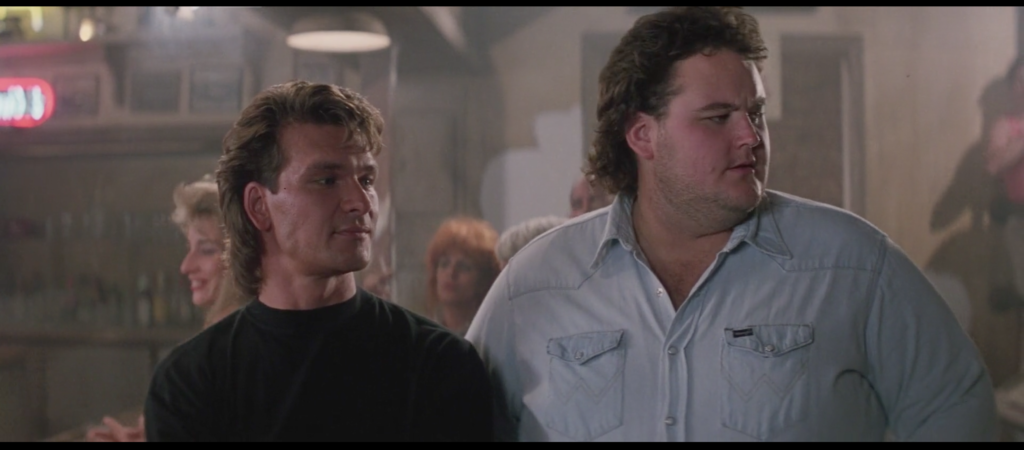
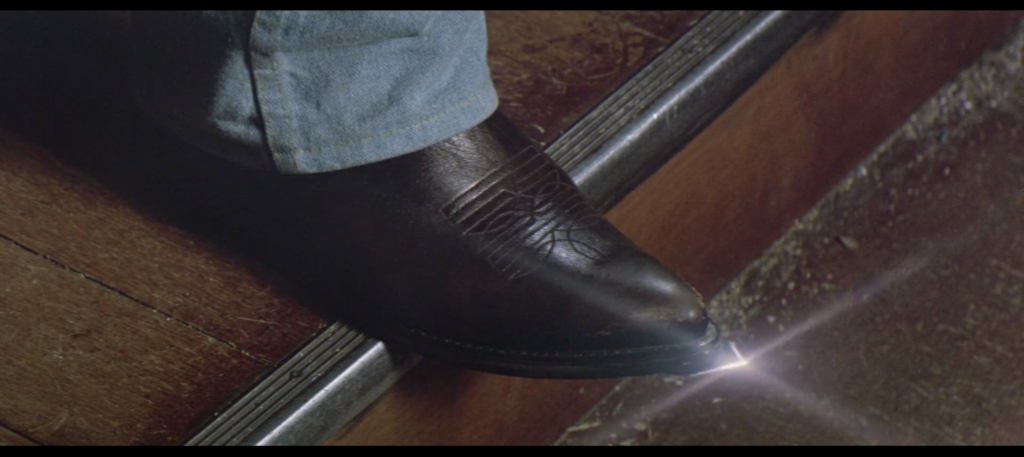
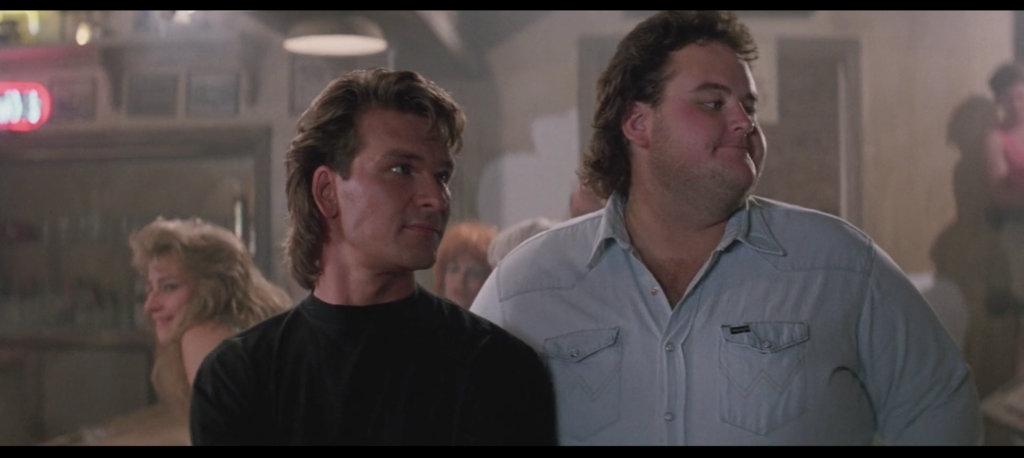
They added a gleam effect to the knife in the boot on the leg of the goon who tries to high-kick Dalton in the head with his knife-mounted boot. Just in case, you know. Even with the closeup—an eyeline match cut from Dalton and his Padawan learner Jack to the boot and then back again (Dalton: “Right boot.” [pause for boot] Jack: “Got it.”)—the audience could have missed it, primarily because even for the kinds of people who might want to watch Road House boot-mounted knives are not the kind of thing you’re trained to spot in the wild. Can’t be too careful, really.
No, really. Let’s review. Never underestimate your opponent. The opponent here is the audience’s inability to recognize a knife sticking out of a Knife Nerd’s shitkicker. Expect the unexpected. You wouldn’t expect someone to miss the knife when it’s one of three things on screen, the other two being the boot and the jeans covering the leg part of the boot, would you? Take it outside. Step beyond the boundaries of yourself and see things through the eyes of others. Never start anything inside the bar unless it’s absolutely necessary. The trouble here started when Brad Wesley, outside the bar, ordered this man to go inside for the express purpose of necessitating violence. Be nice. Dalton’s simply points out the location of the weapon to Jack rather than raising holy hell, a first move echoed when he amasses his bouncers, approaches the boot knife goon with a smile, and simply says the bar is closed. Until it’s time to not be nice. The arrival of the boot knife is the big hand reaching Not Nice O’Clock.
That gleam is not just the light reflected off some jackass’s dopey weapon. It’s Dalton’s bouncer-sense made visible.
053. Why We Fight
February 22, 2019“This has been, without question, one of the worst weeks of my life, but one man offers succor.” I tweeted this with the above picture a few minutes ago, as I sat down to write today’s Road House essay. I knew exactly what I was going to write about, too. I knew the scene, knew the moment, knew the angle, knew how to flesh it out. It’s one of the ideas that made me want to start this project in the first place. So I’ll get to it, probably soon, and I’ll enjoy it and hopefully you’ll enjoy it as well. But wasn’t until I opened up WordPress in a new tab that I realized the thing I posted on twitter before writing today’s Road House essay is today’s Road House essay.
I’m not going to talk about the week I’ve had, or why it’s been so bad, bad enough that as I type this I am home alone with my stepson instead of out with my partner and our friends because we were supposed to go to an all-sad-songs karaoke party together and I am too sad for Sad Song Karaoke. It’s not really my story to tell anyway. I’ll tell you what is, though: Road House. I don’t think I ever fully understood the concept of “comfort viewing” until Road House came into my life. I don’t think there’s any other film like Road House out there. Viewed communally, which is how I watched it the first time, it’s joy, an invitation to participate in the kind of drunken cinematic mental and verbal horseplay that always makes me think of Ozzy Osbourne saying “eat shit and bark at the moon.” It’s a bark at the moon movie. Viewed in a more intimate setting, with just one or two people who’ve never seen it before, it’s the closest thing to taking a child to an amusement park and seeing a world of delight open up before their eyes, seeing it through their eyes, that I’ve ever found this side taking my daughter to Coney Island for the first time. I have yet to screen this movie for any first-timer who didn’t fall in love with it immediately. Viewed with the person I love it feels like a comfortable couch, a long conversation punctuated by bursts of laughter, the easy romantic camaraderie of talking lightly while getting dressed after sex, a car ride soundtracked by songs we both adore, a hit of Gorilla Glue and a sip of Noah’s Mill, a shared secret, a private joke, a glance that means something to us and no one else. Everyone has these things, but no one has our things; that’s how Road House works. Returned to in isolation day after day, night after night, it has proven to be an inexhaustible source of pleasure and inspiration. This dumbass brilliant movie about a famous bouncer’s duel to the death with an unhinged 7-Eleven franchisee and his army of hapless meatheads for the soul of a town populated exclusively by beautiful blonde women, howling yahoos, and the living embodiments of old man smell is a case study in the rewards of close reading, the powers and boundaries of genre and style, the maxim held close to my heart that the energy of every character in any story can be kinetic rather than potential. At the heart of it all is Dalton, warrior, philosopher, guru, hero, lover, killer, smoker, fighter, fatherless son, living breathing erasure of class distinctions, poet of one-liners and vulgarities, preternaturally calm, childishly petulant, soul of a Blake and body of a Baryshnikov in a world that has made him a gladiator, a prophet and a pusher, partly truth partly fiction, a walking contradiction, played by a beautiful man who once said of the cancer that would go on to kill him “I’m in great condition. I’m a cowboy. I’m a dancer. I’ll beat this.” Every punch in the face, every grotesque insult, every dumb joke, every inexplicable line reading, every grin on Ben Gazzara’s face, every sauntering step Sam Elliott takes, every white-blues song on the soundtrack, every remarkable mutant in the cast, every glimpse of Dalton’s face and hair and chest and ass and credo feels to me to have sprung from the heart of the man that said those words—the cowboy and the dancer who raged against the dying of the light. This has been, without question, one of the worst weeks of my life, but one man offers succor.
054. The Ballad of Pat & Tilghman
February 23, 2019Standing in the bar down in Jasper
Sweeping up the eyeballs for thrills
My bartender’s Pat
Hey, at least I have that
Until when Dalton said he’s skimming the till
Christ, you know it ain’t easy
You know how hard it can be
A man named Brad Wesley
He’s gonna crucify me
Finally found myself with some money
Thought I’d fix the place up just right
Dalton helped me to learn
That my man Pat McGurn
Costs me about a hundred-fifty a night
Christ, you know it ain’t easy
You know how hard it can be
A man named Brad Wesley
He’s gonna crucify me
Pat McGurn’s the son of Brad’s only sister
Canning him’ll take me some nerve
I may own the bar
That only takes me so far
Cuz Mr. Wesley owns the liquor I serve
Christ, you know it ain’t easy
You know how hard it can be
A man named Brad Wesley
He’s gonna crucify me
Wesley takes my money almost every day
“Jasper Improvement Society”
It’s his town he said
Oh boy when he’s dead
The killers will be four men who are old (Tink)
“Take the train, consider it severance”
Pat looks at me raising his brow
Incredulous Pat:
“I didn’t hear you say that”
I stammer “Well, I’m sayin’ it now”
Christ, you know it ain’t easy
You know how hard it can be
A man named Brad Wesley
He’s gonna crucify me
Pat McGurn’s my headcanon lover
Firing him makes me start to pout
His voice is a purr
When he asks “are you sure”
Takes all I have to whisper “get out”
Christ, you know it ain’t easy
You know how hard it can be
A man named Brad Wesley
He’s gonna crucify me
A man named Brad Wesley
He’s gonna crucify me
055. Rise and shine
February 24, 2019After a long night of breaking tables with people’s faces, firing bouncers for fucking teenagers in the storeroom, making Frank Tilghman fire Brad Wesley’s nephew (and I think it’s safe to say his own lover) Pat McGurn, and reading Jim Harrison novels while Wesley and his goons have a topless pool party across the water, Dalton likes to get out of bed hungover without drinking a drop the night before and fully nude in front of his co-worker Carrie Ann, light a cigarette before he finishes buttoning the fly of his jeans, and do some light stretches without even taking the lit cig out of his mouth as she presents him with coffee and a jelly donut or a danish or something. That’s just who he is. That’s just how he (jelly)rolls. The whole little morning ritual we see when Carrie Ann pays him her erotically charged visit is a delight precisely because of the incoherent portrait it paints of this man. He’s constantly smoking even when he’s exercising but he turns up his nose at junk food. His entire method of bouncing depends upon everyone reading everyone else for the slightest cues and clues but he walks around bareassed in front of a woman over whom he has hiring and firing authority, who’s there delivering him food out of the goodness of her own heart. He’s a huge nerd who was up all night reading a book, to the point where he frowns upon some relatively wholesome sex-comedy shenanigans over at Wesley’s place, but when he wakes up it’s like he’s coming off a three-day bender. If you sat and tried to depict the contradictory demands of ideal masculinity—stoic yet vulnerable, wise yet monosyllabic, sexy yet oblivious to his own sexiness, abusing the body he treats as a temple—I don’t know if you could come up with a better illustration than a shirtless Dalton doing his morning stretches while smoking like Dan Aykroyd in Ghostbusters while wearing pants he hasn’t quite finished putting on.
056. Gi
February 25, 2019Several martial-arts disciplines utilize the gi, a simple uniform developed over time with the physical and strategic demands of each particular discipline (judo, karate, whatever) in mind. Dalton, who in another life would have made a hell of a mixed martial arts fighter, likes to wear his out on the town sometimes. It’s the only outfit we see him in not once but twice: first on the day he takes a trip to the auto parts store and discovers that Red Webster is getting shaken down by Brad Wesley and his goons, and second on the day of his final mad battle against the Wesleyans. Dalton is wearing a gi when Red springs the original colloquialism “Does a hobbyhorse have a wooden dick?” on him in lieu of the traditional “Is the Pope Catholic?”, and again when he approaches his niece Dr. Elizabeth Clay in the middle of examining the x-ray results for her latest trauma patient and/or colonoscopy recipient to beg her to skip town with him so they can avoid the wrath of her insane Fotomat-owning ex-husband. But I assure you that in neither case did he slip this clean white garment on in anticipation of seeing action. It’s simply the film’s way of communicating that the Dalton Path stretches from East to West. In many ways it’s an equivalent signifier to stretching with a lit cigarette in his mouth, or waking up hung over from a late-night binge-read, or receiving a philosophy degree from NYU for studying “man’s search for faith, that sorta shit” prior to becoming a professional ass-kicker, or asking for a king’s ransom as a salary but living in a place that costs $100 a month and driving a car chosen specifically because it’ll function basically the same if it gets half-destroyed by angry drunks whose noses he’s broken, or doing tai chi by the water in between tours of every greasy spoon and dive bar in town. He is a human mixed martial art. Might as well dress the part.
057. “It’s my way or the highway.”
February 26, 2019Dalton, during the prologue of The Giving of the Rules: “It’s my way or the highway.”
The highway:
Show me the lie.
Whether by accident or design—who can say? alright I can say, it’s by accident—there is no aphorism, no catchphrase, no idiomatic expression, no imbecilic threat or come-on or dick joke in the entirety of this film that does not bear close, even literal, reading. This is what I want to impress upon you more than anything else. This is what inspired this project: the sense that in the 15 years I’ve been watching this movie I haven’t touched bottom any more than you might during a swim in the middle of the ocean. Road House is a journey of discovery, a highway if you will, and the higher you fly the deeper you go the deeper you go the higher you fly so come on come on come on it’s such a joy.
058. The Sentry
February 27, 2019The shadow lies upon Wade Garrett when first we see him. He stands ramrod straight, stiff lipped, chin up, eyes alert. He rocks back and forth from the intensity of the vigilance thrumming in every sinew and synapse. To his right is a sign of prohibition. To his left, a box controlling the generative energy of the bar itself. Behind him, a doorway, barred by his very body. His hair is grey with the knowledge and peril of the long years, and his raiment is black. Wade Garrett knows the gate. Wade Garrett is the gate. Wade Garrett is the key and guardian of the gate.
At that very moment, here’s what he’s looking at.
Not without professional cause, mind you. Within seconds, a horned-up Marine yells “CHARGE!” and rushes the stage, and Wade must rush into action. He sits the jarhead’s ass back down and defuses the situation with a quip about Rambo and saving the world from the Commies that shows Dalton is not the only cooler for whom Be Nice is a cardinal rule. But his protégé, strong though his game may be, could never match the sly grin Wade flashes at the dancer he rescued, who smiles and winks appreciatively in return. Condoms have been lab-tested with less.
What can we learn of the Way of Wade Garrett from this sequence? Most obviously, the integrity of the Wet T-Shirt G-String CONTEST every NITE! would rightfully be called into question but for his presence. We see that humor, even irony, feature prominently in his bouncing arsenal. We see him through the eyes of a dozen drunk, erection-toting members of the United States Marine Corps, who view him as likeable enough, formidable enough, or most likely both to allow him to lay hands on one of their number and walk away unscathed (and bowlegged). He is himself horny, and hairy, but not handsy. He’s quick to action, but not eager for it; not for him is Dalton’s remonstrance to Morgan about not having “the right temperament for the trade.”
And from that first look at him, standing silent sentry in the half light, we see that he harbors within him a darkness—one that does not belie the revelry with which he surrounds himself and the merry manner in which he polices it, but which informs and complements it. He is only at ease because he knows all there is in the world to worry about. Those things have worried at him, and he has held them at bay. For now, anyway. For now.
059. Men in Black
February 28, 2019When I wrote about Wade Garrett yesterday, I remembered something about his black t-shirt: He’s not the only cooler in the movie to wear one. The other of course is Dalton—but it’s not like he wears it all the time. The movie shows us he’s molded in Wade’s by deploying black in his wardrobe on three key occasions.
Attentive readers of Pain Don’t Hurt will have guessed the first by now: The Giving of the Rules. This takes place prior to Wade’s introduction, directly linking the older man’s debut to the establishment of his acolyte’s doctrine.
The second is the fight that takes place the night he and Doc have their first date, which is also the first time we see him on the job after we meet Wade. This reinforces the sense of succession while also tying Dalton’s romantic flourishing to the older man’s tutelage.
The third is his impromptu breakfast summit with Brad Wesley, during which Wesley brings up his checkered past and offers to hire him away from the Double Deuce. It’s not a t-shirt here but a collared shirt, as befits this more formal occasion. But the dialogue makes direct reference to an event in Dalton’s past that Wade will also bring up (while wearing a collared black shirt himself) later in the movie, and shows Dalton standing up to an asshole in a way that would do his mentor proud—even if he’d likely suggest getting out of Dodge afterwards.
Clothes make the man. Clothes mate the men.


